Ocellus WinterIssue49 2022

T H E
Front cover image: Yaseen Abdelal (Second Form, Feilden) on the rifle range at Cokethorpe Shooting Club
Inside front cover: artwork by Daisy Colliss Quinton (OC 2022, Feilden)
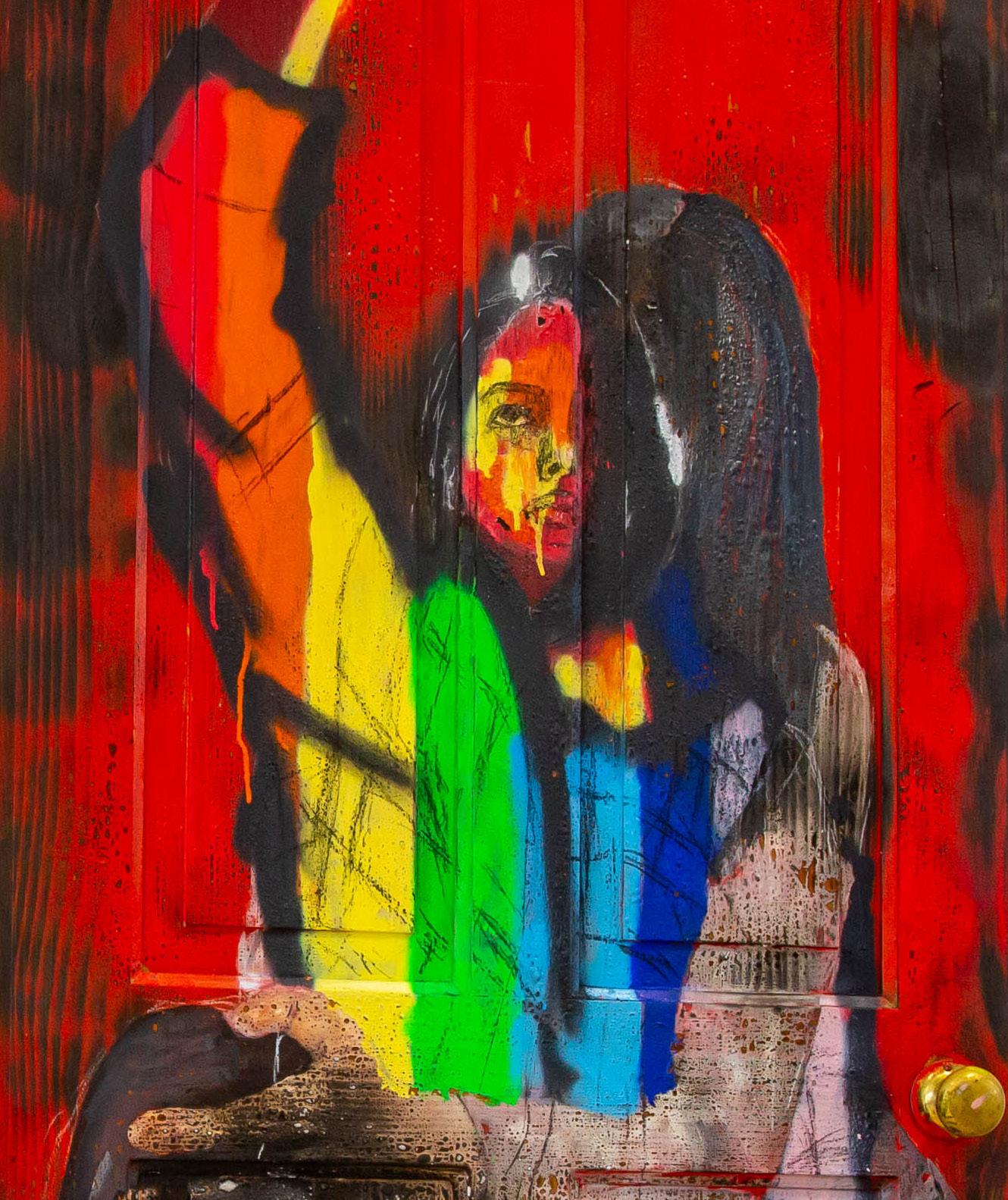
Back cover image: Sculpture created by A Level Art students inspired by a trip to the Botanic Gardens.
With this publication, Cokethorpe School has balanced through World Land Trust the equivalent of 177kg of carbon dioxide.

In this issue...
Scholarly Pride
Pages 2-4
Play-based Learning
Pages 6-7
Microsoft Innovative Educator
Page 13
Senior School AOB

Pages 16-17
Breadth of Offering
Leonardo da Vinci is described as a polymath. This Greek word means ‘having learned much’. In his case that amounted to being a painter, a draughtsman, an engineer, a scientist, a theorist, a sculptor, and an architect, and he achieved all that without access to Wikipedia. I suppose he must have relied on studying, and drawing on the wisdom of his teachers! Of course, one could ask, ‘what’s the point, when we have just one lifetime?’. Not everyone can be like da Vinci, and we all know the adage, ‘Jack of all trades, master of none’. Better perhaps to learn to do one thing, and to do it well. In essence, that was the driving force of education for centuries: turning out able political leaders, administrators, engineers and soldiers. But it is an educational philosophy that reflected a time when life was short, and a person’s orisons, along with their horizons, were quite limited. The poor, and so usually less educated people, lived subsistence lives, laboured long hours to build the economy, and often died young. Others, many of them also dedicating their whole lives, administered it, and defended it. Some, of course, exploited it. It was a time, I suspect, when the expression ‘self-realisation’ would have been thought very ‘woke’. The focus was not on the personal development of the individual, but on the efficient functioning of the organisation, as though somehow that was the valued end in itself. But, like many people, I am more persuaded by Aristotle’s view that the only worthwhile ‘end in itself’ is the personal satisfaction that comes from a life well lived, and a person can only achieve that when they know their capabilities. The great Renaissance, of which Leonardo da Vinci was a herald, brought a better understanding of the richness of human nature, that each person has a range of abilities that are often never uncovered. In part, this is because they need to be stimulated and drawn out, which is precisely the meaning of education, and which now underpins the educational approach of most good schools. That is also why art, music and drama should play such an important role in school life, along with debating and creative writing, and why ever greater importance is attached to the development of critical thinking skills. They can help to release untapped riches. To put it simply, we cannot become the best people we can be until we recognise and develop what lies within our capacity. It goes without saying that this opportunity, part of what it is to be human, should be open to all, and not to the polymathic few.

1 Headmaster’s Welcome
How long have you headed Cokethorpe’s Scholars’ Programme?
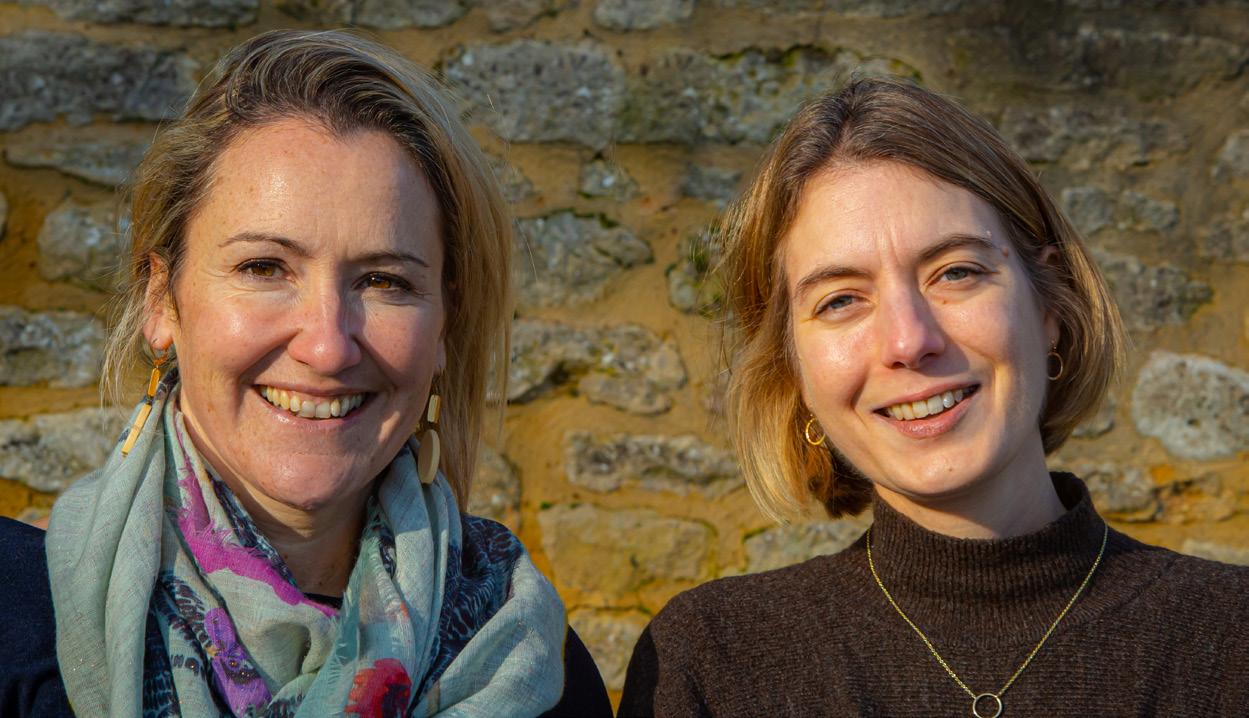
I took on co-responsibility for the programme four years ago with a former colleague and was joined by Dr Oldham two years ago.
SH
And what do we aim to achieve through the Programme?
First and foremost, we want to offer a varied programme that enriches the Scholars’ learning, extending the rigours of the academic challenges they face in the classroom.
SH
SCHOLARLY PRIDE
Our Heads of Scholars, Dr Harrison (SH) and Dr Oldham (CO), discuss the Scholars’ Programme and their plans for its future.
That is certainly the main aim, though what we have also found with the changes made to the programme –pupils opting in and committing to the additional workload as a Scholar – is a community feel among the Scholars, a form of identity that is being looked on positively by their peers as a desirable figurative badge to wear. That is a powerful thing for the broader attitudes to learning in the School.
When we consider those core and more traditional elements of the programme – the Exhibition, the Scholars’ Dinner, and the Scholars’ Journal – it is about helping the Scholars to achieve those skills that will help serve them in their future academic and working lives, be that presentation or interview skills, their research credentials, or the ability to engage in and converse effectively during a formal dinner setting. They are all important skills too, of course.
You touched on skills which are recognisable within our Leadership Programme; how do the programmes interact?
One of the things we look to cultivate with the Scholars is a sense of ambition, perhaps beyond what they might recognise that word to mean. I think some of that ambition is bred by building confidence, which we
help foster through presenting at the Exhibition Evening and debating in the Scholars’ AOB sessions and other occasions, enhancing their public speaking skills. But also ambition in the sense of exposing them to new opportunities and career paths they might not have considered previously; for instance, the trip we went on to New Scientist Live.
SH
Responsibility is also a big part of the process, with the pupils taking responsibility for their work, whether that be research for a debate, journal entry or Exhibition piece, or by enhancing the reputation of the Scholars through their engagement in lessons. These are all areas that they take full ownership of themselves and they, quite rightly, take great pride in that.
CO
And how does a pupil become a Scholar?
The process has changed this year. There are now three points of entry: First Form, Third Form and Lower Sixth. The First Form apply in the latter half of the Michaelmas Term, allowing them to get used to the pace of life in the Senior School first. They are invited to submit a letter of application to us outlining why they want to be a Scholar, followed by an interview process,

CO
so not unlike applying for a job. The Third Form applications come at the end of the preceeding Summer Term, and includes their end of year examination results, as well as the letter and an interview. Finally, they also sit an additional Scholarship Paper at the end of their exams. The timings are slightly different for external candidates, who can apply for the Programme on joining the School, but the process is otherwise the same. The process for Fifth Form applicants to become a Sixth Form Scholar is the same other than the Scholarship Paper being replaced by a presentation of their choice for five minutes, with a five-minute Q&A to follow.
The Programme has also been broken down now, with a re-application made at First Form, Third Form and for Sixth Form. Our expectation would always previously have been that the Scholars would have displayed all of the attitudes and skills to keep them in the Programme, however, pupils change, commitments change, priorities change. That is why we ask them to reapply; it is an opportunity to take responsibility and ensures the collaborative benefits of being a Scholar continue to be felt by all.
CO and SH
The Scholars’ Exhibition Evening is one of the most visible outputs of the Programme; how does it work?

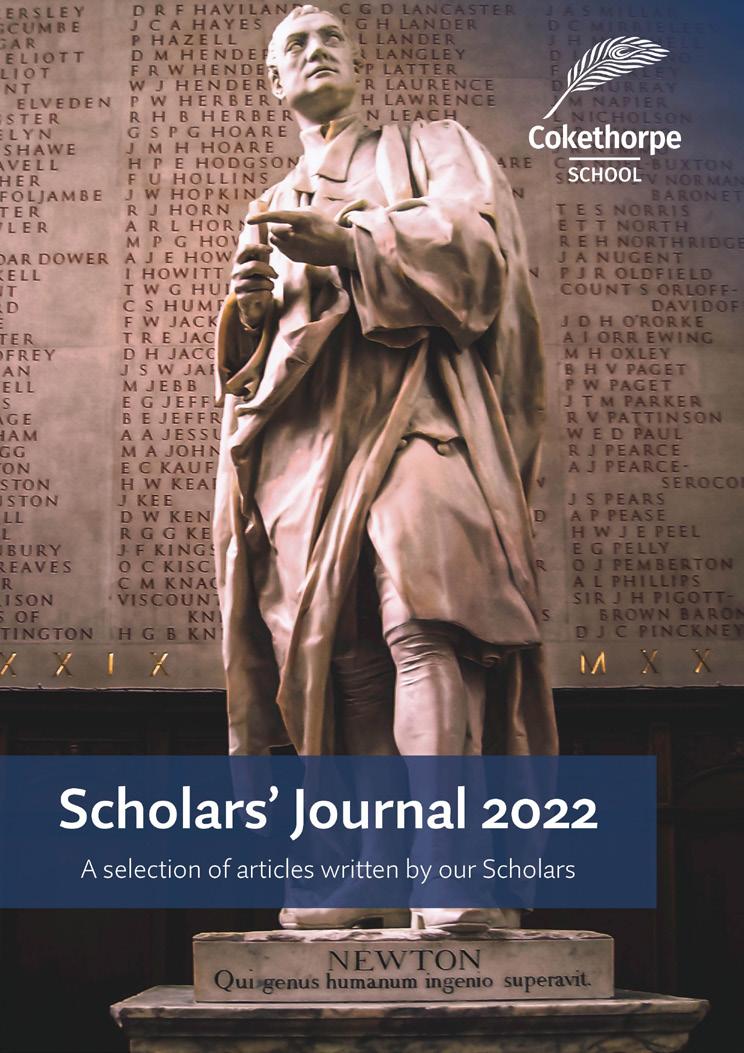
The Scholars from First Form to Fourth Form undertake their independent research projects during the Scholars’ AOB session each week.
These are initially guided by ushelping them to select appropriate subjects for research, where they might like to conduct that research, and so on - but after that they really
take the lead and their output is very much their own. In the older year groups, the onus is very much on them, in keeping with the expectations of Sixth Form study.
The quality and breadth of work produced across the board was superb and was perhaps best reflected in the depth of knowledge shown when parents, staff and peers questioned them, and in the sheer enthusiasm of the Scholars in answering those questions throughout the course of the evening. I think we really benefit from the careers, expertise, and wider interests of parents in this setting as well, with questions being raised that challenge, intrigue and inspire the Scholars in their areas of research.
CO and SH
You have made a number of changes to the Scholarship Programme for this year, what was your objective for these changes?
When I first became involved with the Programme, being an Academic Scholar was, I think, almost felt to be a prestige title by the pupils as, in truth, it often is in other schools. There were some activities for the Scholars in the past, but we felt we could achieve more. One of the things we have tried to do is initiate a structured and rigorous programme through which the Scholars are doing things to actively merit the title of ‘Scholar’ rather than a more tacit assumption that strong exam results and classroom performance was enough to have the title bestowed.
There is still a prestige element, of course, but the programme now goes beyond it and
achieves something that is more pragmatic in many ways.
SH
The wider pupil body’s perspective of the Programme has shifted with that. Being a Scholar is really becoming a thing of envy and reverence, which is a good thing for everyone. You can see this in the number of applications that have been made this year already. We are not simply looking to add to or advance the classroom learning through this Programme; through the trips, activities and showcases of work, we are seeking to enhance their overall knowledge and approaches to furthering it. When we are looking to appoint a Scholar, we are not just looking for the best exam
3
results but also considering their attitudes, approaches and enthusiasm for academic subjects outside of the classroom.
In fact, one of the pupils in interview when asked if Scholarship should be about being the best in the year said ‘no’, their work ethic, their ambition, and their empathy and support towards other pupils in their work were just as important. We could not agree more.
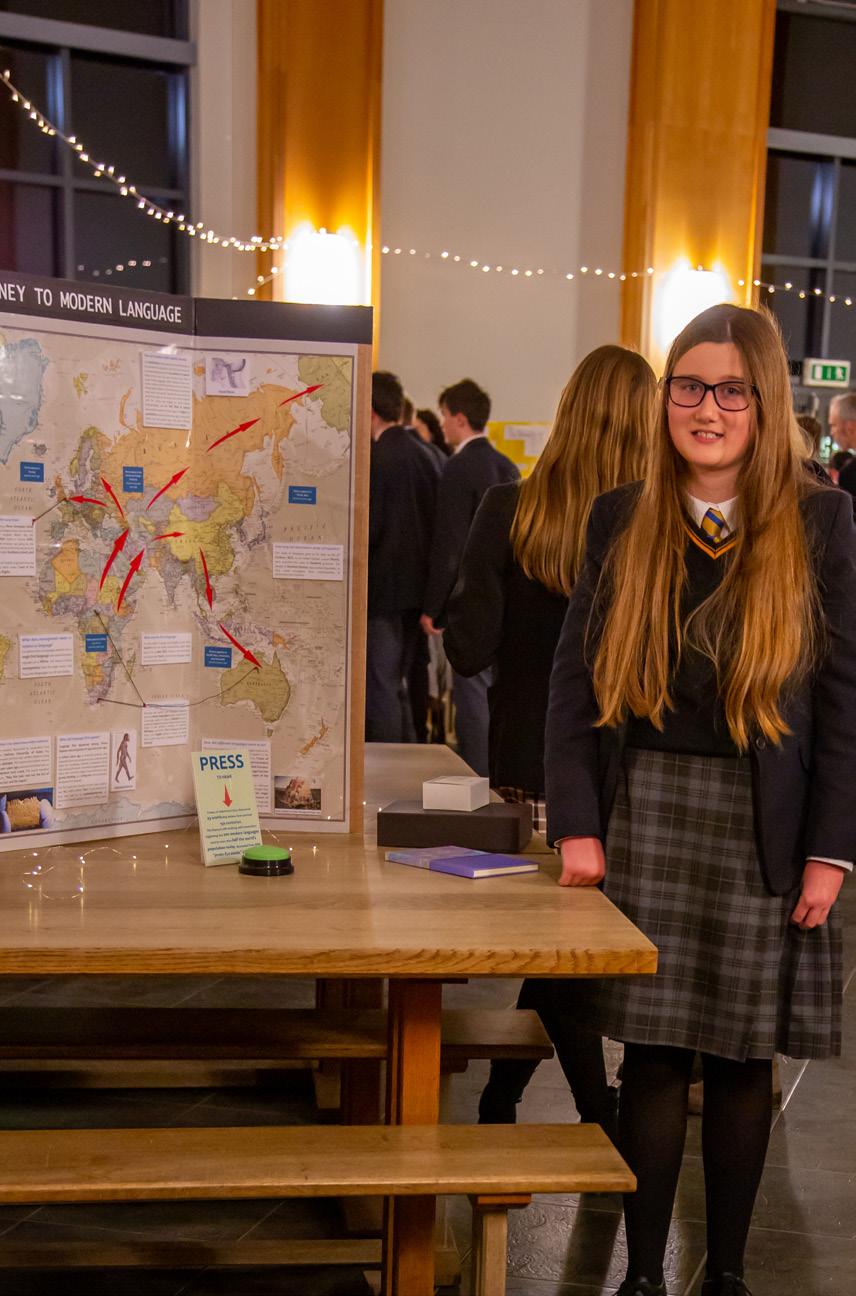
CO
We also now have a re-structuring of the Sixth Form Scholars Programme. Essentially, what we used to have was a group whose involvement with the Programme was entirely based on their GCSE performance. We thus had a cohort of very academically able pupils, but not all of those pupils exhibited the wider traits that we want to cultivate among the Scholars. Add to that the former Sports, Art, Drama and Design Award holders who may have become Leadership
Award Holders and there was a much broader grouping. By shifting the emphasis and creating the ‘opt in’ application process, we are able to select academic scholars who really do want to engage with this specific programme.
SH
What are the other formats through which the Scholars can exhibit their work?
I think it is really important for the Scholars to understand that learning and research is a process, as indeed it is for all pupils. At the Exhibition Evening, when the Scholars are presenting their work and answering those questions, that is their work to date rather than the final piece. That point is a juncture by which they can refine their ideas, realise where they have gaps in what they have done so far and can continue that process.
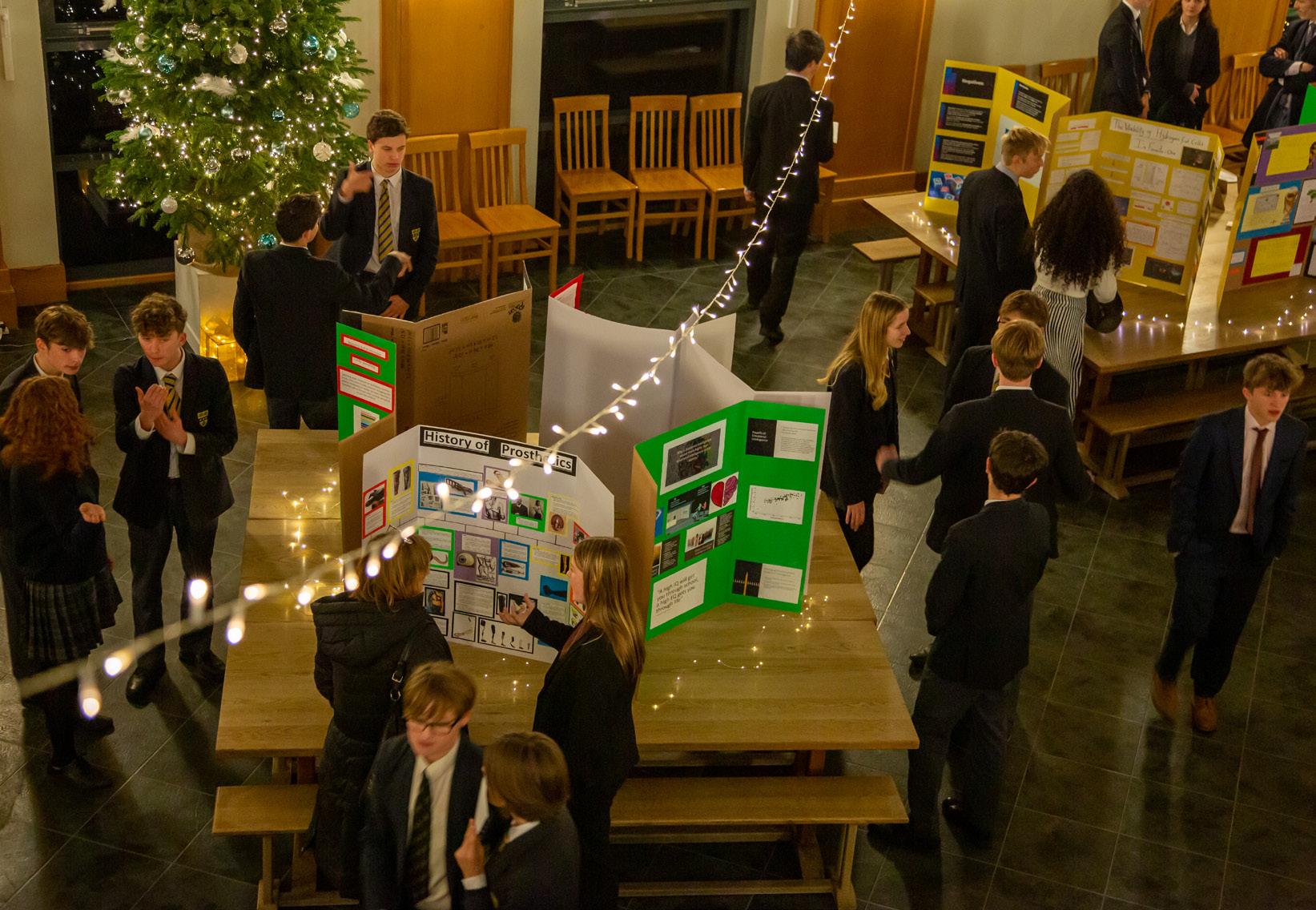
We have previously produced the Scholars’ Journal annually which was an opportunity for the Scholars to write up their research and findings formally. This was always a positive experience for
them by way of improving their written communication skills across disciplines. We are now intending to alternate the Scholars’ Journal with a Scholars’ podcast, allowing them to develop their communication skills in a different way.
SH
We opted for this approach in consultation with the pupils. There was a desire to try something new, whilst recognising the benefits of developing those more traditional communication skills. Given that some of them could otherwise be writing a journal article every year from First Form to Upper Sixth, we felt we had the space within the Programme to afford them that opportunity. I think it is fair to say we are all rather excited about this new venture!
CO
Dr Harrison and Dr Oldham were speaking with Mr Griffiths, Head of Marketing
4
Amelie Boyle (Third Form, Harcourt) with her exhibition display on The Journey to Modern Language
Adventure Club
Often in their wellies, hats and full waterproofs, pupils in the Prep Adventure Club meet every Friday afternoon to build, play, climb, chase and explore. Across the term, pupils will engage in a wide range of outdoor activities that aim to help develop risk awareness, confidence, and teamwork whilst engaging with the environment and others. Some activities that feature include large team games across the School site, bushcraft in the woods, climbing, air rifle shooting, orienteering and campcraft. Personal development is recognised using the National Outdoor Learning Award (NOLA), a chance to reflect on three key areas of ‘you’, ‘others’ and ‘the environment’; how pupils have been safe and respectful, as well as what they have learnt. The final session of the term features a large campfire where pupils share their highs, lows and favourite moments of the term and are awarded their well-earned NOLA badge.
PREP SCHOOL ACTIVITIES

Bead and Wire Suncatcher Club
This term, pupils in Years 5 and 6 have been acquiring the necessary skills to create beautiful suncatchers, in the Bead and Wire Suncatcher Club. Following a design process, they have learned the basic techniques, beginning by cutting and shaping the wire into the outline of their design. The next stage was to choose from a vast range of glass faceted beads, in a myriad of colours and sizes. After many weeks of perseverance and precision, their masterpieces were ready to be displayed. The finished pieces were absolutely stunning; so professional and eye-catching. This club continues to be extremely popular, and will continue during the Lent Term, both for existing beaders and those who wish to learn the art.

Ballet
The Jill Stew School of Dance is delighted to offer ballet classes to the Prep School at both of our studios in Witney and at Cokethorpe itself. These classes are fun and engaging and follow The Royal Academy of Dance Syllabus supplemented by free work. Pupils attending these classes develop their focus, creativity and appreciation of music in a fun and positive learning environment and are encouraged to work towards taking examinations.
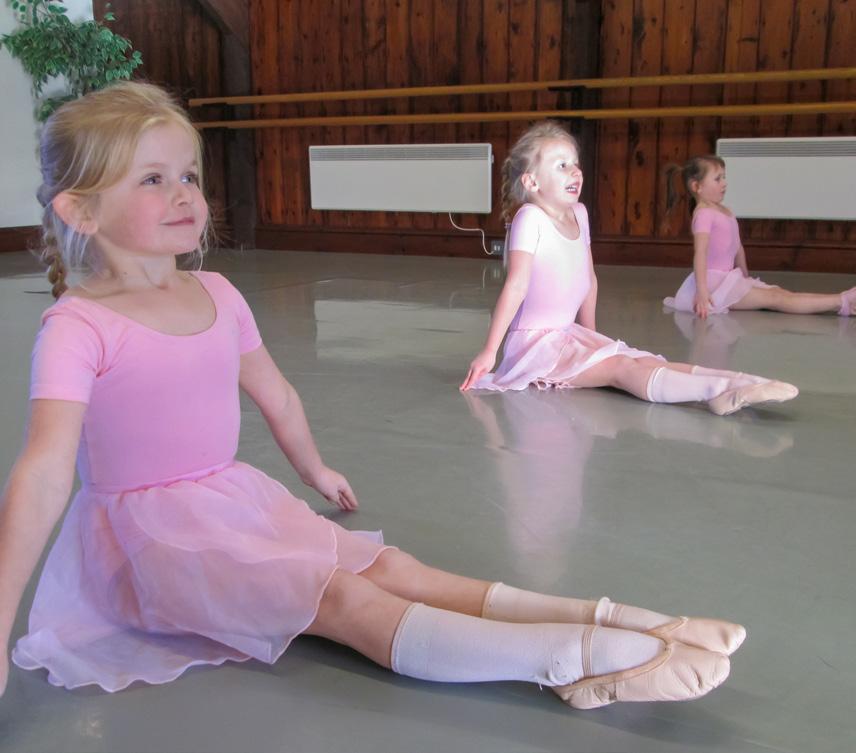
Handwriting Club
When neat, cursive handwriting becomes automatic, pupils can focus on other aspects of writing such as composition, grammar and editing. More time can be spent on planning and publishing when pupils can write at legible speed. Handwriting is a complex skill which not all find easy, so pupils are welcome to join a Friday afternoon Handwriting Club during which they can peacefully improve the skill. With visuomotor perception in mind, children are given projects to enhance their letter formation, placement, spacing, directionality and joins. Gross and fine motor strength and coordination, tool hold, posture and paper position are some of
the systems addressed to help the pupils achieve a neat cursive script. Relaxing music is played to integrate the auditory senses. Pupils very much enjoy working with their peers, earning prizes and completing fun activities such as the ‘Vowel and The Pussycat’ whilst augmenting their script.

PLAY-BASED LEARNING
We spoke to Reception Class teacher Mrs Brash on the benefits of play-based learning in the Early Years Foundation Stage.
What is play-based learning?
The main thing that differentiates play-based learning from other types of learning is that it is child-directed and child-led. It is not something that has been asked of the child but is based on their interests and what they want to learn about. It is self-chosen, enjoyable, interesting, stimulating, unstructured, engaging, involving lots of language and conversations. This is the key focus of the Early Years Foundation Stage (EYFS) and is one of the best and most effective forms of learning for children in the younger years. Guided play is another form of play-based learning where educational activities can be gently steered by an adult. This type of play allows children the freedom to explore whilst also building on key elements of the curriculum that the adult would like to develop.
How do you implement this in the classroom setting?
In Reception Class, we spend time really getting to know the children before they even start school. We invite them to visit weekly throughout the summer before they join,
and visit them at home and nursery. We send home packs in the summer before the start of term to gain an idea of what makes each individual child tick. Gaining an insight into the child’s likes and dislikes enables us to tailor the opportunities available to that child based on their interests. This provides an opportunity to ensure the activities and areas of the classroom will stimulate the children, enhancing their learning opportunities through play.
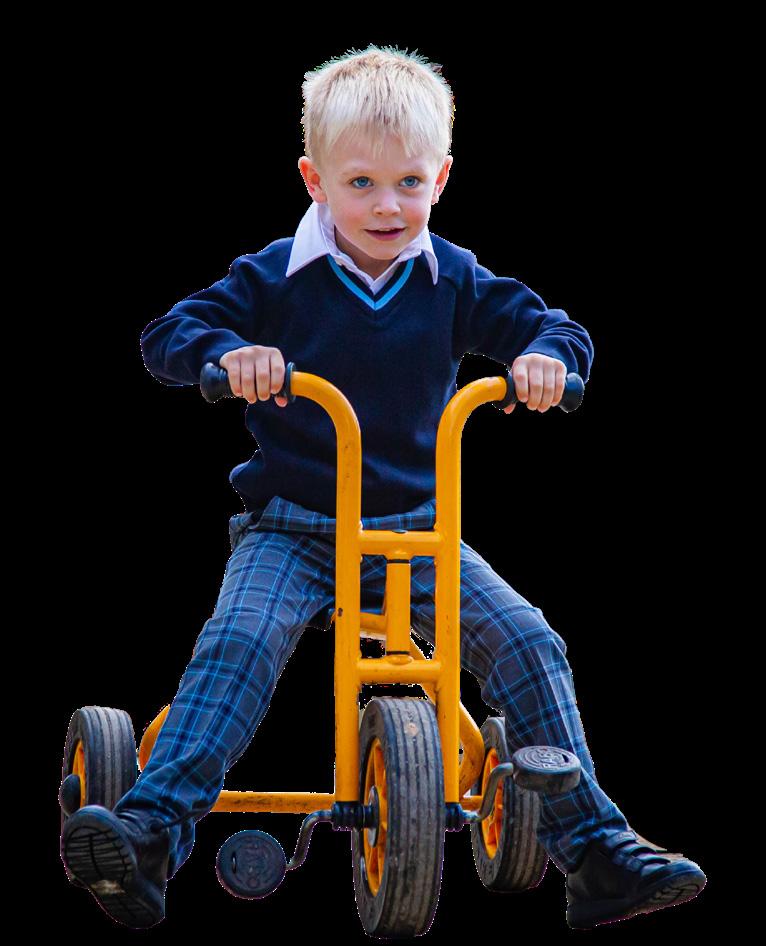
Does play-based learning negate the need to follow the curriculum?
Not at all. Play-based learning, whether child-led or guided, is a way of enhancing learning opportunities which is used in conjunction with the more formal aspects of the EYFS curriculum. In Reception, as in all years, there are clear goals and targets for children to meet; learning to read and write letters, numbers and introducing scientific concepts for example. The Early Learning goals are packed with information that children need to learn and retain. A combination of child-led, guided and adult-directed teaching is at the core of what Reception Class is about. In our experience, a well-managed play-based approach leads to better outcomes for pupils because they are motivated and engaged.
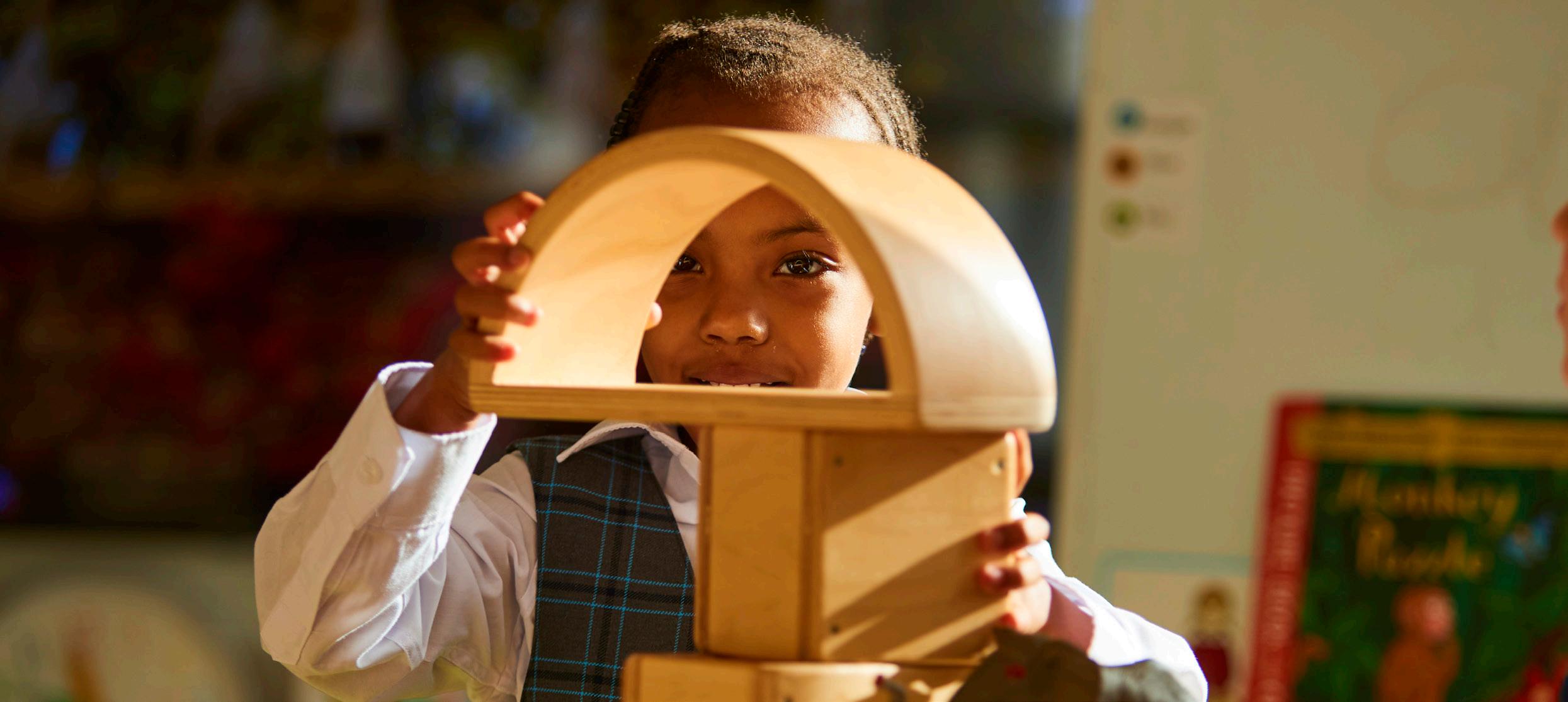
How do you facilitate play-based learning in the school day?
The timetable dictates how and when we teach the various elements of Reception education. The day begins with phonics, with the length of sessions increasing from 20 minutes to 40 minutes as the children become more focused. During the day we have what we call ‘cool time’. These timetabled independent learning sessions are opportunities where the children can choose what they want to do. During this time, we can observe the children playing and play with them. We can encourage the use of language we have introduced or reinforce any taught concepts.
Why is it important?
For so many reasons. It promotes so much of what the Early Years Curriculum is about, especially the three prime areas: communication and language, personal, social and emotional development, and physical development. Children are able to focus on a self-chosen task far longer than an adult-directed task. Early years education is about the whole child.
It promotes language skills because the children have to talk to each other and are continually problem solving. It instils a confidence in them and helps to deal with conflict as they have to negotiate with each other. It develops motivation and curiosity, develops friendships and teaches empathy.
How does it inform your approach to learning?
We work hard to provide the children with a balance of play-based and adult-led learning, and also to provide the resources that support this. The Early Learning goals are in place to ensure children meet the goals required for Key Stage 1. It is important not just that we teach them what they need to know, but to understand the best way and time to teach it to make it relevant. If it is not relevant and has no purpose, then it has no place.
Is play-based learning only relevant for Reception?
No, it is a huge part of every child’s life. Our Head of Prep, Mrs Black, is a firm advocate of play-based learning. Children learn best when they are enjoying what they are doing. Obviously, as children progress through the School, learning becomes more structured but, through our creative curriculum, the principles are extended promoting continued exploration and problem-solving through relevant topics.
How does the setting and learning environment support this?
The Reception classroom has different zones, enabling children to go off during their cool time and choose what they want to do. Early Years classrooms can often appear cluttered, because they need to have a range of easily accessible resources. If they have not got them to hand, how are they supposed to play?
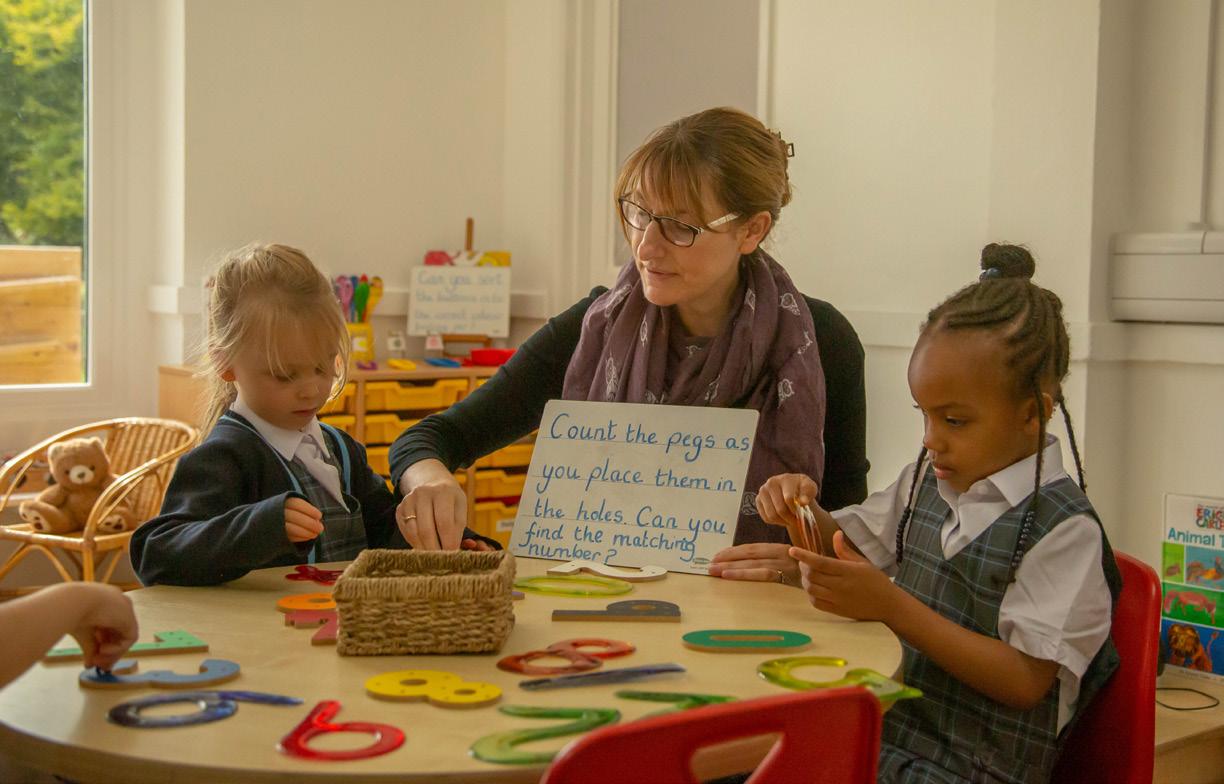
The newly built Reception classrooms have been designed with this in mind. There are so many areas within the space that the children have access to, such as: painting, a playdoh malleable area, construction, craft, small world, maths, an ICT area with iPads, telephones, toys and remote control cars, a writing area (messaging centre), book corner, dressing up corner, home corner, role play and an outdoor area with sandpits, water table, bikes and a workbench. We also have timetabled access to The Woods which is a shared space, and the Secret Woods which Mr Slader and volunteers from the Sixth Form created exclusively for Pre-Prep.
We also have exploration zones which is a continuous provision set up by the adult. When the children stop interacting with it, we change them. This year we started with a nature area, with plant pots with acorns, chestnuts and plants. This creates further learning opportunities for the children, who were able to sort the objects and make pictures for example.
What skills does it teach?
The skills are endless and we have highlighted many of these already; language, problem solving, motivation, curiosity, fine gross motor skills, strength, control of movement and awareness of themselves. We firmly believe that play-based learning is vital to the development of our wonderful Reception Class children.
7
To what extent were voting rights earned through protest?
By Jupiter Smith (Second Form, Swift)
Protest, as William Faulkner once said, ‘Never be afraid to raise your voice for honesty and truth and compassion against injustice and lying and greed’. As we know, the world is unfair and if left to their own devices man will rule over man for one’s own greed. The beautiful thing about modern first world countries is that we have the right to protest and voice our opinions. People nowadays love to exercise this right, and sometimes it can go too far, like when a protest turns to a riot. However, all in all the right to protest is a special thing that some people nowadays abuse or do not realise how lucky we are, for it was not always this way ‘Disobedience is the true foundation of liberty. The obedient must be slaves.’ Once said by Henry David Thoreau.
If we look back two hundred years, we see that the minorities were oppressed. Before 1815 in England only the very wealthy upper-class men could have a vote. It would not have changed without protest. For example, the date was the sixteenth of August 1819. Many families: men, women and children had gathered at St. Peter’s Field Manchester. In total 60,000 people had come to listen to a peaceful talk on democracy, in essence they were lower- and middleclass families hoping to be informed about democracy and the changes needed to make the system fair. However, this all turned south when the police misinterpreted this as a riot. At the end fifteen people were dead and the key speaker Henry Hunt was
arrested for no reason other than the fact that he planned to give a speech on democracy. We all know if you can keep the bad people rich and the good people afraid you can do anything. So was the case with England at the time, there was a small minority with money and power, they did not care about the poor majority, as long as they were rich, all was good. Consequentially, therefore protest can be majestic, it can give the masses a chance to create an uprising and put pressure on the rich and powerful establishment. After Peterloo, the Guardian newspaper was started as a voice of the regular people. People were appalled by the tragedy; this caused civil unrest and so came the great reform act of 1832.
After the great reform act of 1832, the people were still angry; not much had changed, there was still a need for reform. In 1838-1857 a group formed, and they called themselves Chartists. There were six things they wanted which were:
1. A vote for every man over 21 who was mentally fit and not in prison
2. The ballot should be anonymous
3. Members of parliament do not need to have property, so any one can run (rich or poor)
4. Members of parliament will be paid.
5. Equal constituencies make the system fair
6. There is a vote every year.
These things seem normal to us, but they would have been mind blowing for the people who wrote them. They believed that it was their right (as it was) to a fair and just system.
The results of Chartism were that by 1918 five out of their six goals were met. It was the first mass working
class political movement. By 1842 there were 50,000 chartists, there were 400 branches across England. There were three main petitions 1830, 1842 and 1848. They even had their own newspaper ‘The Northern Star’. Which at its peak distributed 38,000 copies. It was important for its scale of petitions. They presented to parliament the 1839 petition which had 1.3 million signatures, 1842 had 3.3 million and the 1848 had six million signatures, however some of these turned out to be fake. The 1848 petition was presented after a meeting of an estimated 150,000 Chartists. Former Chartists would start many trade unions and socialist groups. Both the Whigs and the Tories declared that the great reform act of 1832 was final. The Chartists kept alive the hope of further reforms. However, the true power of the Chartists was not what they achieved but what they stood for.
One of the biggest reforms was the Representation of the People Act which was signed in 1918. Then by law women could vote, however it was not a battle won easily. The suffragette movement was founded by Emmeline Pankhurst and her daughters, other prominent members were Millicent Garrett Fawcett, Christabel Pankhurst,

8
ACADEMIC SHOWCASE
Sylvia Pankhurst and Elizabeth Cady Stanton. They were the women who spearheaded the operation. The suffragettes would smash windows, disrupt the postal service, burn buildings and politicians’ homes when unoccupied. One of the biggest protests of the suffragette movement was 1910 black Friday. The Women’s Social and Political Union (WSPU) who were leading the protest had been founded in 1903, determined to try to get votes for women by any means necessary. The suffragettes were met by a large police force who, controversially, instead of arresting the women, as was previously the precedent, caused violent clashes to ensue. Over the next six hours 200 women were assaulted; there were claims of police misconduct, acts of violence. People all over England were
An investigation into the benefits of naturally derived medicines vs gene therapy and tissue engineering in the treatment of heart failure
By Amelia Pratley (Upper Sixth, Swift)
Abstract
Throughout this investigation, I consult various medical articles and books to evaluate whether naturally derived medicines such as digitalis and statins, or more modern treatments such as tissue engineering and gene therapy are more useful in improving quality of life in congestive heart failure patients. Although I was impressed by the benefits of taking inspiration from the natural world to
Acrostic Poems
HAWK By Alex Regardsoe (Year 6, Gwyn)
High above the clouds you soar so gracefully.
All-seeing; your eye watches the prey.
While it idles unready you
Kill it, unexpectedly.
SNAKE By Oliver Mettrick (Year 5, Symonds)
Slinking across the muddy forest floor.
Nutritious rodents scamper away.
Armour-plated reptiles slither, guarding their territory.
Kings of the understory.
Every victim dies from its deadly venom.
appalled. The police were stuck in a cycle that they could not win; when the suffragettes were arrested they would be taken to prison, following this they would then go on hunger strike and be released.
In the end, the suffragettes and chartists were able to put enough pressure on politicians and cause civil unrest to the point that it became easier to just give votes to every man or woman over the age of 21. The right to protest can give the masses the chance to change things that need to be changed, If the people above did not protest, there is a chance things would not be the way they are today. Personally, I think protest played a major role in giving the vote to everyone.
develop medicines, I realised that tissue engineering was the most promising method of tackling the root cause of decreased quality of life: permanent fibrosis of the heart’s left, ventricular wall. Despite the potential of such revolutionary treatments, it was necessary to evaluate all ethical limitations, particularly when research involved the use of animals or embryonic stem cells – an issue that is particularly relevant amidst abortion debates in the USA. In the end, I concluded that tissue engineering to create cardiac grafts would tackle the root cause of this pressing health concern most effectively, as long as informed consent is obtained and upheld throughout the treatment.
BLUE WHALE By Roemer
Tweehuijsen (Year 4, Lockwood)
Blue colours flood over its body.
Lonely? Never! There are always fish swimming around.
Under the sea it lives with beauty and glory.
Endangered species - stop hunting whales and polluting the seas!
When hitting its tail against the surface - glorious splashes.
Hunted the world over, killed so sadly.
Antarctic Ocean it lives in too.
Lovely animal
Eats shrimp and other small sea animals.
KOALA by Catriona Rounce (Year 3, Lockwood)
King of the trees,
Often foraging for leaves
Adorable babies,
Living in Australia with
A love of Eucalyptus.
STICK INSECT by Leonardo De Silva (Year 2, Lockwood)
Scared of predators,
Tries to disguise
Itself with
Camouflage.
Keeping still!
Interesting creature,
Never recognised.
Stick-like
Eating Leaves
Careful with him he’s
Tiny to spot!
9
Head of Duke of Edinburgh (DofE), Mr Bosse, and Head of Outdoor Education, Mr Slader, spoke to us about the Duke of Edinburgh’s Award and the offering here at Cokethorpe.

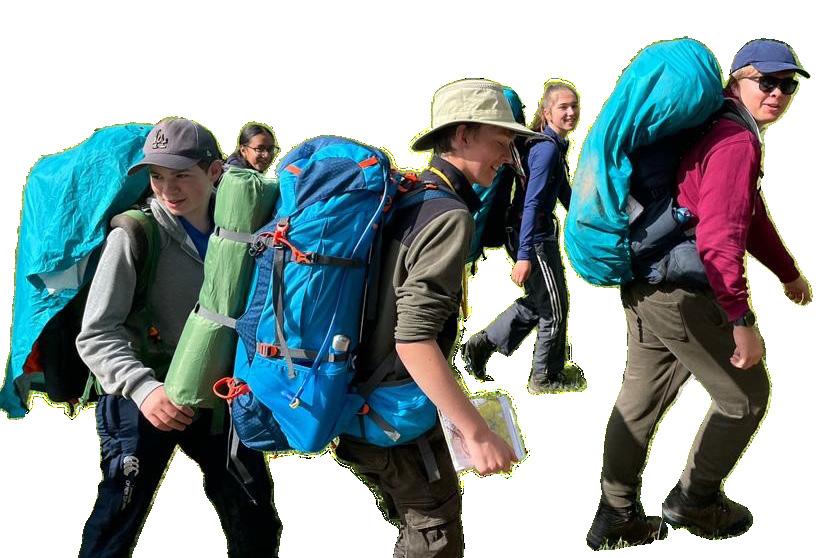
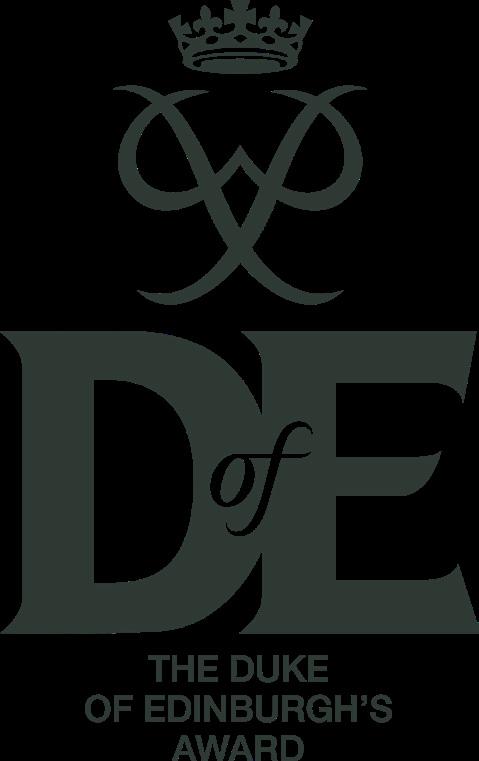
What is the Duke of Edinburgh’s Award?
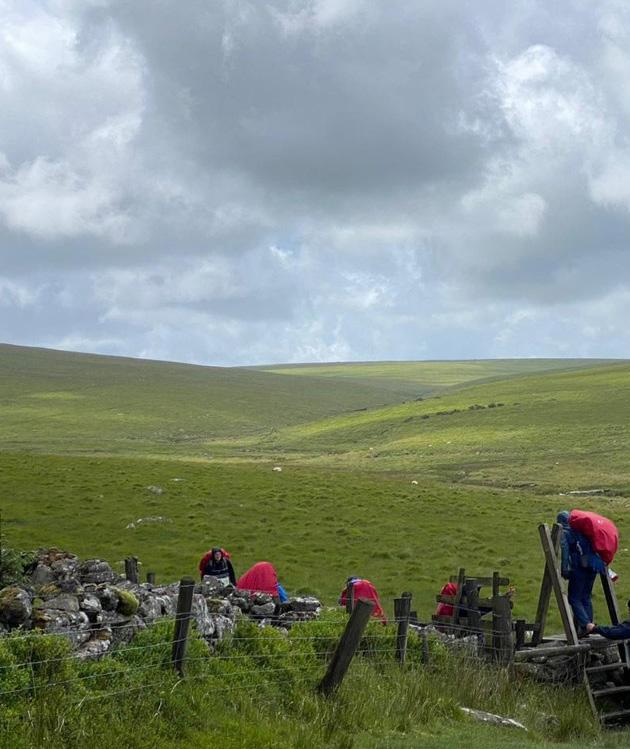
The Award was created by the Duke of Edinburgh in the postwar era, originally intended to bridge the gap between leaving formal education and entering National Service. Now, having been running for a number of decades, the Award continues to encourage young people to try something new, discover new hobbies and give something back to the community.
How is it structured?
There are three levels; Bronze, Silver and Gold. The amount of time you have to commit to each section increases as you move up the Awards, as does the length of the expedition. The Bronze Award residential is two days and one night, Silver moves to three days and two nights and Gold is four days and three nights. You tend to start with the Bronze Award and progress through to Gold, however the awards are not a requirement to progress to the next level.
There are four sections: Physical, Skills, Volunteering and Expedition. For the Gold Award, there is an additional Residential section.
How long does it take to complete?
The Bronze Award can be completed in six months if
the Third Form, if the remaining sections are completed by the Fourth Form, pupils are able to pick up the Silver Award at the same time. The minimum time requirement to complete the Silver Award is twelve months, Gold Award is eighteen months.
What is the offering at
Cokethorpe?
We offer all three levels. There has been a slight change to the programme at Cokethorpe this year. In previous years, completion of the Bronze Award was compulsory. This year, the expedition will be carried out in CEW (Curriculum Enrichment Week) which will satisfy the expedition requirement for those who choose to sign up for it. The expedition element remains compulsory. We believe this is an important experience for pupils; encouraging them to engage with the outdoors, try hiking and camping, as well as the many other skills taking part in an expedition such as this offers.
Pupils will also have the option to use their School sport to complete the Physical section and an AOB as their Skill. This gives pupils the opportunity to complete a large proportion of the Award in School time, but also moves the onus to the pupil to take ownership of completing the Award themselves.
How much of the Award is independently led?
For the expedition section, pupils plot and plan a walking route across a given countryside area. Staff remotely supervise groups, giving the ownership of decision making to the pupils. Pupils are encouraged to take the lead in the other sections. Staff are on-hand to support, advise and encourage, but a key element to achieving this Award is one of our Leadership traits – responsibility.
In the Residential section which is only applicable to the Gold Award, students go on a five-day residential
experience. It is entirely up to the student what they decide to do, options have included cooking courses, marine biology courses, living in a lock house, an archaeological dig (Mr Bosse) and sailing around the Canaries (Mr Slader).
Do all schools offer DofE?
A number of schools do, but not all. We are different to a lot of other schools in having a dedicated Outdoor Education Department and a Head of DofE. This gives pupils the best opportunities and support.
Why do we offer DofE?
As a School, we believe that education extends beyond the classroom. We recognise the importance of creating well-rounded individuals, evident in the time commitment given to our Games Programme and AOB offering. DofE is an important part of that overall education, it aligns with the ethos of the School and brand of education we strive to provide for our pupils. DofE also has the potential to introduce a new skill, sport or passion to a pupil that they may continue for life. It is such an exciting prospect.
We want to raise well-rounded individuals and leaders. All of our Leadership traits - ICEJAR - are evident in the various sections of the Award; Integrity, Courage, Empathy, Judgment, Ambition and Responsibility.
One of the most talked about benefits of doing DofE is that it improves UCAS applications and CVs. What are the other benefits of undertaking the Award?
The opportunity to experience new things, gain new skills, find a new passion in life, have fun with peers, a greater appreciation for the outdoors, the list goes on. Not to mention the benefits to community and the School from the volunteering aspect, which can be so rewarding for the pupils themselves. There is such variety in the choice of volunteering opportunities, pupils have written letters to people in care homes, landscaped the local area, walked pets for the elderly, or closer to home, we have Lower Sixth students who run a Maths Clinic, helping the younger pupils in the School.
What are some of the key skills pupils can learn from doing DofE?
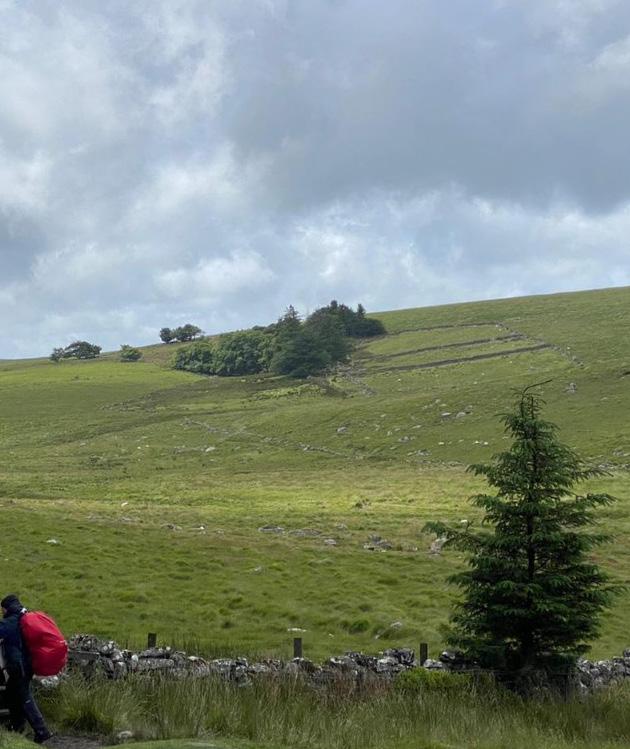
There are fundamental skills such as working together in groups, delegating and taking responsibility. The remote supervision element of the Award is really important, where pupils are amongst peers and in a position where they have to make decisions for themselves without
asking a member of staff. The decision process as a small team is a significant learning experience. Pupils also learn a number of other more specific skills, including map reading, campcraft and cooking.
What do we do prior to the DofE which might prepare our younger pupils to undertake the Award?
By building up the Outdoor Education Department, we are reinforcing that culture and ethos of spending time in the outdoors. Encouraging pupils to think about ways in which they take on risk and how they work together in those challenging situations. These are important skills to instil in pupils from an early age, to better equip them to take on challenges such as the DofE.
What comes after the DofE?
Our hope is that the DofE inspires pupils to go off and have their own adventures. One OC for example, Ella Shaw (OC 2022, Harcourt), finished her Gold Award and then did an expedition climbing Mount Kilimanjaro.
What is next for the DofE programme at Cokethorpe?
We are working towards getting the expedition element of the Gold DofE to be fully organised by the students, adding another level of responsibility and giving them a greater sense of achievement.

We would also like to offer other modes of transport for the Gold DofE expedition section - it can be completed by cycling, horse-riding or canoeing the course. As we build up the expertise we have in the School, we can expand the offering.
It is an exciting time for the Outdoor Education Department, there is plenty in store over the next couple of years!
Curriculum Enrichment Week is part of the traditional climax to the Senior School year – four days of activities before the whole School gathers together for the formality and celebrations of Prize Giving on the Friday.
With academic lessons collapsed for four consecutive days, we have a huge opportunity in terms of the programme that we put together. Fun is very much at the heart of what we do but what lies beneath is the product of a great deal of
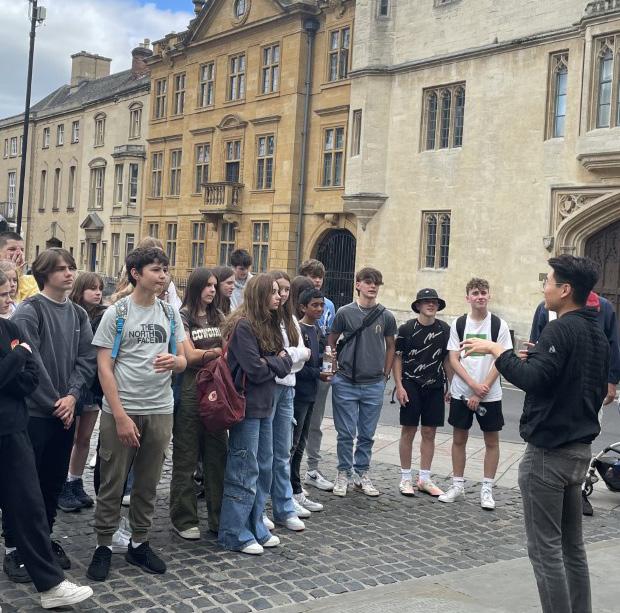
thought, time and energy in terms of how we can support and develop the School’s values and a number of its pre-existing programmes as well as looking for opportunities to promote pupils’ self-confidence, self-esteem, resilience and inter-personal relationships. Whilst there tend to be a number of activities that feature from year to year, we are always looking at the overall programme with a view to keeping things fresh and relevant.
MEET THE SCHOOL - MR SLADER
What do you do at the School?
As Head of Outdoor Education, I help facilitate a wide range of outdoor activities, adventures and outdoor learning opportunities across all ages at the School.
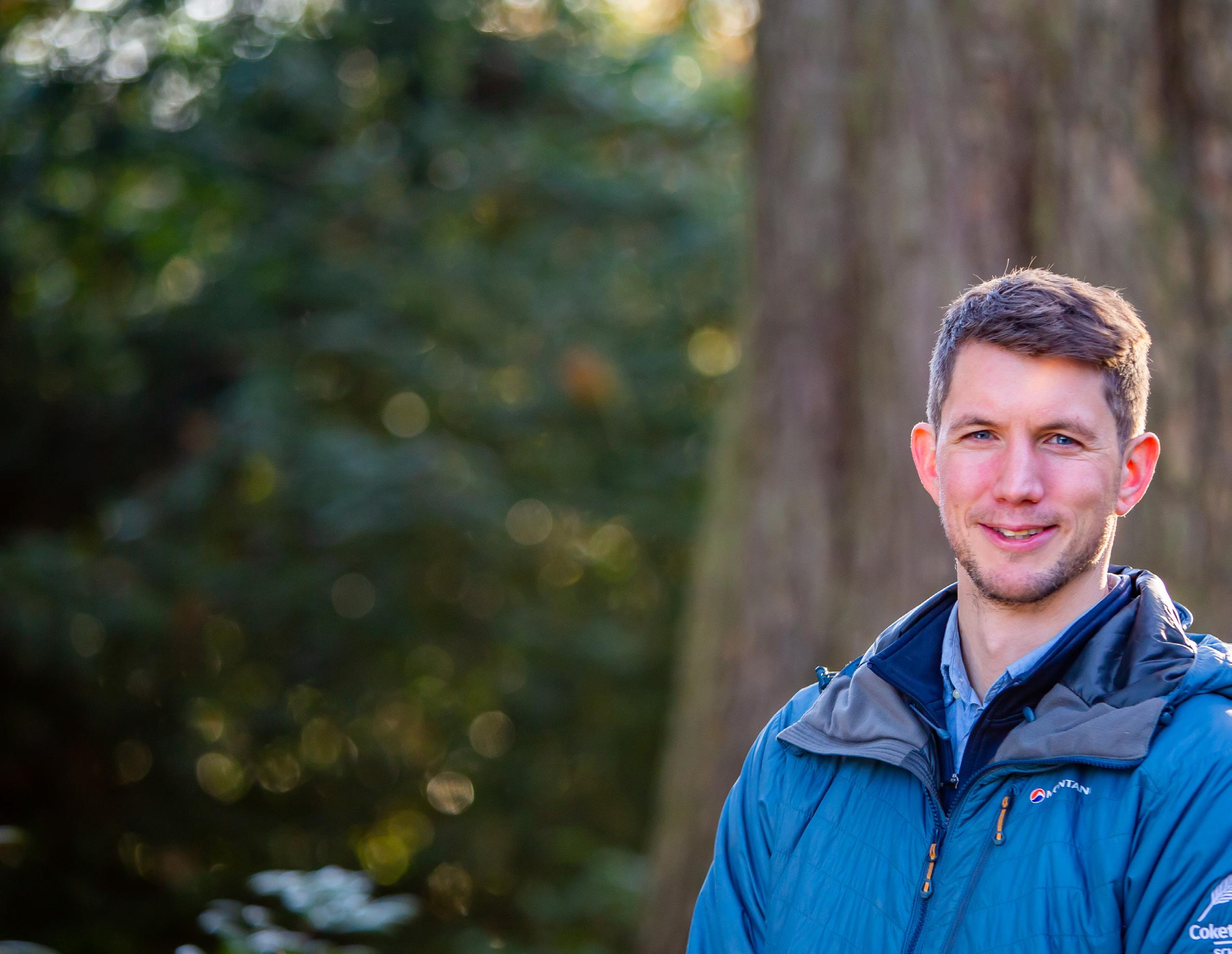
When did you join?
I joined in 2021.
What does a typical day look like for you?
My days are very varied; from being on the river delivering marathon kayaking training to a fire lighting activity with the Prep School in the woods. To safely deliver the wonderful range of activities on offer, there is a large amount of work that goes on in the background - organising, planning and risk assessing.
What do you enjoy most about your job?
Seeing pupils challenge themselves, overcome fears, take responsibility, learn new skills, take on leadership, assess risks and connect with nature in whatever the activity may be is hugely rewarding.
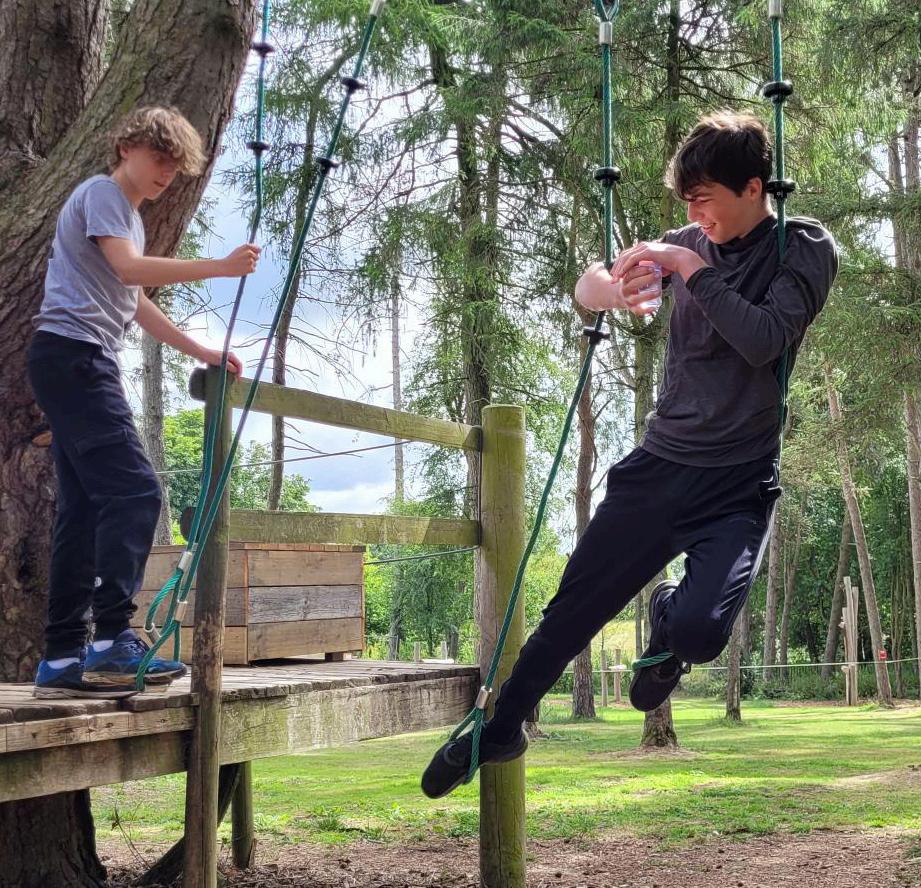
How do you spend your free time?
As a first-time father since September, my free time has certainly changed to focus around the new exciting adventure of raising my daughter! My passion for the outdoors does not stop at School, however. I still enjoy trail running with my dog, open water swimming, climbing, and cycling to name but a few.
What are your plans for Outdoor Education at Cokethorpe?
The stunning parkland setting, access to the Thames and a vibrant and adventurous staffing body at Cokethorpe ensures the outdoors is very much part of the culture. I plan to build on this foundation to provide more accessible and adventurous opportunities to our pupils, partnership schools and the local community. With the development of a new orienteering course, woodland area, archery range, team building activities and, not forgetting the new climbing tower, it is a very exciting time to be part of Cokethorpe School!
CURRICULUM ENRICHMENT WEEK
Recently, the School was awarded the Microsoft Innovative Educator status. What does this mean and how does it benefit the School and our stakeholders?
The Microsoft Innovative Educator is an accreditation by Microsoft, recognising the achievements of a school in terms of its digital learning. It demonstrates that, as a school we are using Microsoft products and, more generally, using technology, in an innovative and forward-thinking manner, reflected in the way we teach at Cokethorpe. There are around 600 schools in the world that have received this accreditation, with only 77 in the UK, so it is certainly an impressive achievement.
The process of becoming a MIE School began when the IT Steering Committee highlighted some areas for improvement around the School, which included standardising devices and classroom set ups. Having a TV, whiteboard and surface pro dock in each classroom has enabled consistent working between staff and pupils across the School and means staff can work in any classroom.
Communication has also been standardised across the School with the use of Microsoft Teams. The
MICROSOFT INNOVATIVE EDUCATOR
advantages of our pupils all being taught to use the myriad Microsoft programmes available, means not only consistency of communication, but also that pupils are well-equipped for their futures beyond Cokethorpe, with universities and employers alike using the systems.

The use of OneNote enables staff and pupils to work from a single platform, allowing them to share, collaborate on, and show peers and teachers their work, interacting on a single document. This is as effective for use in the classroom as it is when working on projects or homework.
The effective rollout of Surface Pros to staff and pupils was the beginning of the longer-term plan, which resulted in the School becoming a Showcase School. Last year, we enrolled on the incubator programme, meeting with Microsoft every month to see how to apply the process, meeting a set of rubrics
to demonstrate how we have undergone digital transformation in the School and submitting this to Microsoft. The School will have to apply for the accreditation every year to demonstrate that we continue to be digitally innovative.
We are also now part of a big community and are working closely with two schools who also have the accreditation. On Thursday 27 April, we are planning to host a ‘Showcase Day’. This in-person event will invite teachers, leaders, governors, administrative staff, anyone who has an interest in what we are doing, to come to Cokethorpe and see for themselves.
The IT Steering Committee has also initiated a review of the processes and packages we use, which we continue to strive to improve. Our aim is to make these work in the most efficient way for our stakeholders –staff, parents and pupils.
MUSIC AT COKETHORPE
Stratford (where Shakepeare is buried). During this time, I was fortunate enough to be a part of two significant anniversaries, in 2014 – 450 years since his birth, and in 2016 – the 400th anniversary of his death. We worked with the Royal Shakespeare Company, and even had a visit from King Charles with my choir performing a piece I wrote.
What brought you to Cokethorpe?
the orchestra and choir; in one of my previous roles, I managed to increase chorister numbers from six to 36, so I have high hopes for the Cokethorpe Choir! I am also looking to put together a string group, a clarinet ensemble, flute ensemble and jazz band.
What can we look forward to in the coming months from the Music Department?


We met with our newly appointed Director of Music, Mr Wilson, to talk about his background and plans for the Music Department.
What is your musical background?
My background is in Choral music and my principal instruments are the piano and organ. Before Cokethorpe, I spent three years as the Head of Choral Music at Shrewsbury School
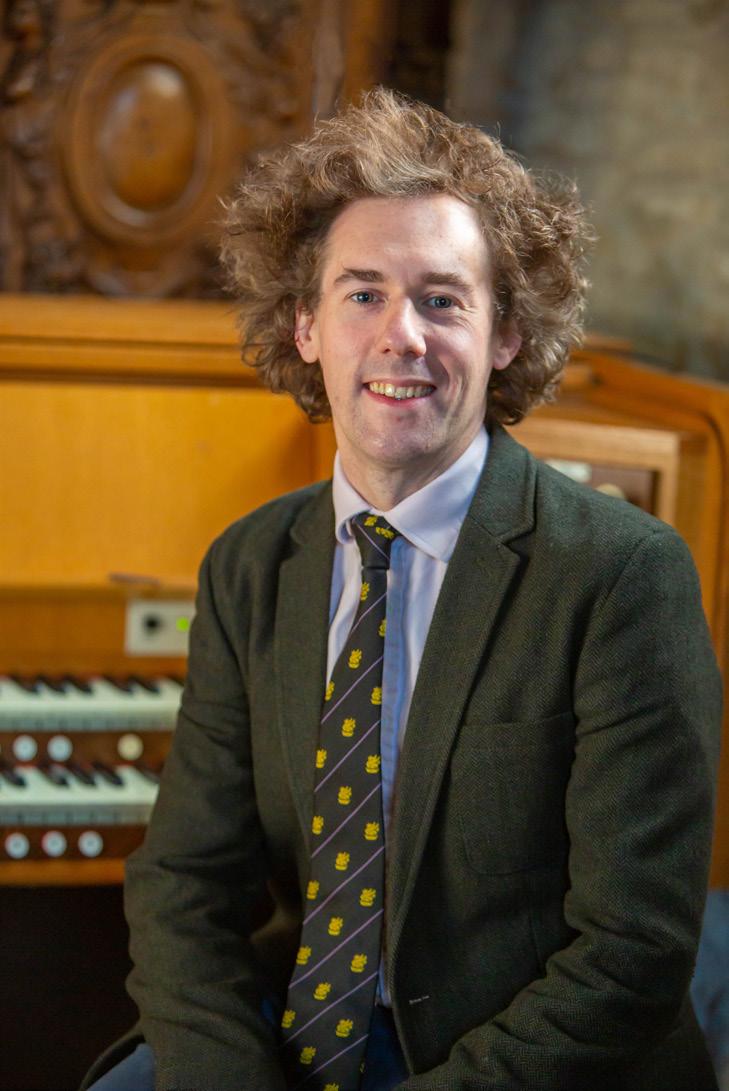
I was impressed by the all-roundedness and breadth of education offered to the pupils here. I love that the focus is on the individual and that a pupil’s education is very much tailored to their interests and strengths. The emphasis is on understanding and feeling passionate about a subject, not just learning something to pass an exam; that really appealed to me and has certainly been evident in my time here already.
Not only that, it is such a beautiful setting, the grounds are incredible. The other thing that appealed to me is having a Prep School attached. Music is generally (though not always!) something that you become passionate about from a young age, so to be able to share my passion for music with pupils in the Prep School is really important to me.
What are your plans for expanding the current music provision?
Currently, the School has a wonderful orchestra and a choir, and some fantastic AOB groups. There is already a Concert Band, and a newly formed Rock Band. I would like to increase numbers in both
My first concert was the St Cecilia Concert (see the write up on the opposite page). Next, we have the wonderful Young Musician of the Year competition in the Lent Term, and I am also planning to hold a weekly recital – with the working title ‘Corinthian Concerts and Cake’. This will be open to the whole School community, including the Prep School. The idea is to embed a positive musical culture, whether it is somebody learning a grade 1 piece or playing a grade 8 piece, no matter what level, age or instrument, everyone is encouraged to play to gain that all important performance practice.
Performance is clearly an important part of your plans. Music and, in particular, performance, has been detrimentally affected by COVID. During lockdown, when concerts were online and pupils were unable to perform to a live audience, pupils were recording themselves. This enables you to have multiple goes at perfecting a piece and, if you are not happy with that particular performance, you are able to stop and delete that recording and repeat until you are happy with it. However, that is not how live performance
works, you only get one go. When you are suddenly performing in front of an audience again, the nerves and the pressure can get the better of you, so it is important to re-learn how to cope with that pressure. Not having performance practice can also mean you lose a sense of purpose – Why am I learning this? What am I working towards? Performance is such a fundamental part of playing an instrument, it is imperative to get as much practice of performing as we can.
St Cecilia Concert
Do you
have any plans for the Prep School?
Certainly. There is a wonderful Prep Choir run by Mrs Du Feu, but I have also started a Prep School Chamber Choir for our most talented singers in Years 5 and 6. The Prep School has two Chapels per week, where they sing two hymns, and there is also a soloist performance once a week too so they already perform regularly. One of my key aims is to integrate music in the Prep and Senior Schools so I would love to see more involvement from the Prep School in the St Cecilia Concert, for example. It is an exciting time for the Prep and Senior Schools in the Music Department.
Over 100 Senior School pupils gathered in The Shed on Thursday 17 November for the first large-scale concert since the pandemic. The concert began with an energetic and lively performance by the orchestra, playing some of Hans Zimmer’s most famous compositions for film.


The audience was treated to solo and ensemble performances, played by pupils from all years in the Senior School. Tom Fletcher (Fifth Form, Swift) was the first soloist to perform with a confident rendition of I Hear What You Say by Ben Crosland. Oscar Luckett (Fifth Form, Vanbrugh) and Jamie Wehrle (Upper Sixth, Queen Anne), two stalwarts of all things singing, were next up, moving the audience with Dear Theodosia from Hamilton. Saša Wilson’s piece (Upper Sixth, Feilden) also impressed the audience, which was followed by a rousing performance of I Just Gotta Sing from a First Form group.
Caellum Sharp (Fifth Form, Vanbrugh) showcased his talent in the first movement of Handel’s sparkling Sonata in F major; he was followed by Grace Gunn (Lower Sixth, Gascoigne) on the piano and Edward Chorley (Fifth Form, Gascoigne) on trombone, both performing jazz, albeit in different styles, but both beautifully capturing the atmosphere of their respective pieces. Musical Theatre was again represented, this time, by Grace Ponsford (Fifth Form,
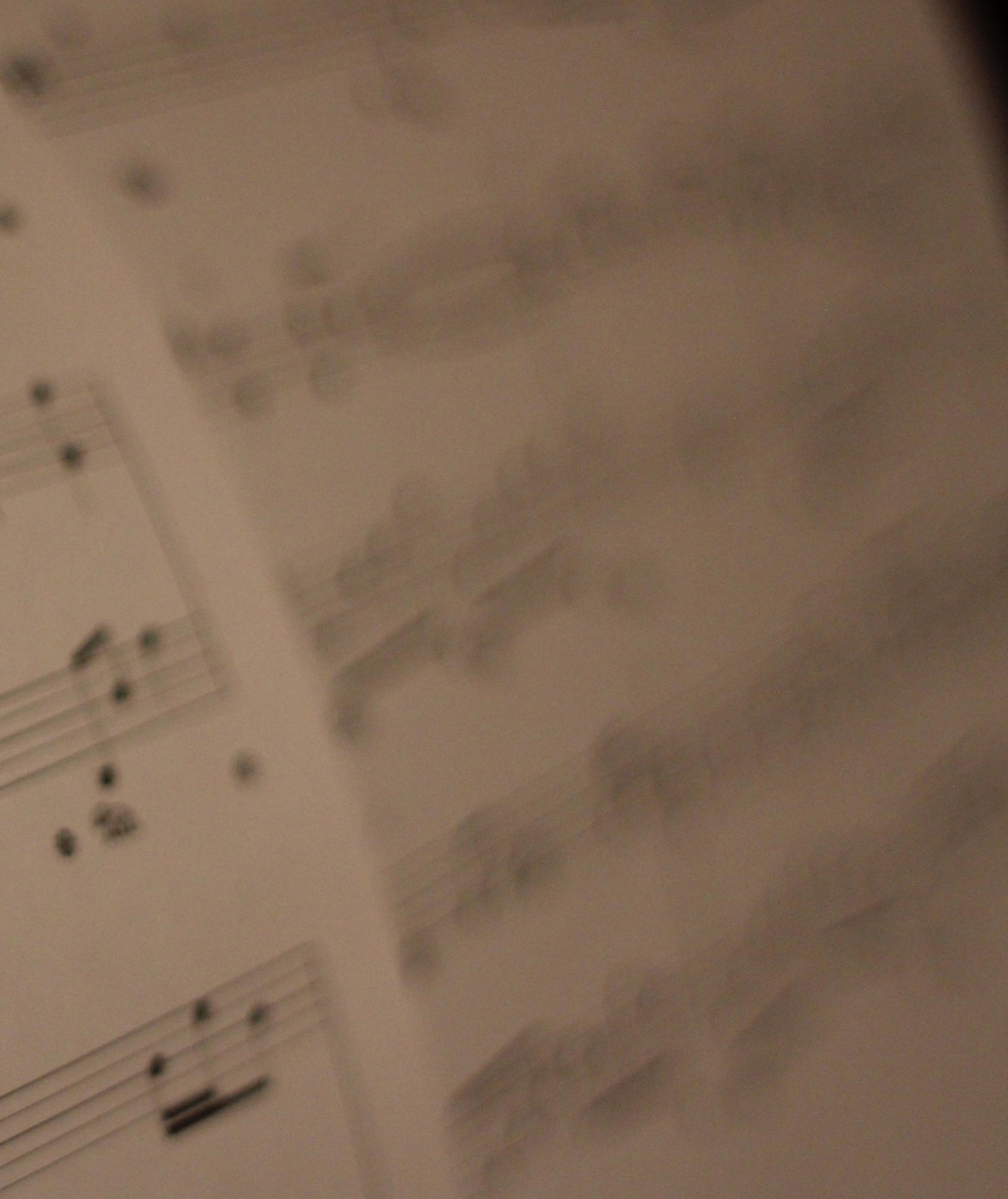
Gascoigne). Anna Pratley (Lower Sixth, Feilden) treated the audience to a dazzling and virtuosic rendition of Monti’s most famous composition, Czardas, after which we heard Tell My Father from The Civil War, poignantly sung by Jamie Wehrle.
Yichao Sun (Upper Sixth, Vanbrugh) provided a delicate and stirring interpretation of Brouwer’s piece, Un Dia de Noviembre. The School Choir then performed For the Fallen – a beautiful anthem, heard throughout the country on Remembrance Day.
It was a joy then to hear Leaving the Home by Johow, performed by the Sharp siblings, Caellum (Fifth Form, Vanbrugh), Sophie (Third Form, Vanbrugh) and Ella (Third Form, Vanbrugh). Nancy Christensen (Fifth Form, Swift) was the final soloist to play, performing with sophistication and style.
The evening concluded with a performance by the entire First Form, who had worked tirelessly in preparing songs from the musical Les Misérables. They commanded the stage and their combined sound was not only huge, but it was full of emotion, diction, energy, vigour and enthusiasm. Particular congratulations must go to the soloists: Atalanta Cannell (Queen Anne), Lottie Graves (Gascoigne), Molly Harding (Feilden), Daisy Mathieson (Gascoigne), Iona Mettrick (Swift), Emily Mulcahy (Harcourt) and Tillie Read (Gascoigne).
SENIOR SCHOOL AOB
The AOB Programme has over 160 activities, clubs or societies on offer to our Senior School pupils. AOBs are timetabled throughout the school week and are integral to life in the School.
Historia Refecta

Last Summer Term, the History Department re-orientated the existing History AOB around Historical manufacturing and living history. This term, pupils have begun researching the technology used by Vikings to build and sail Viking Longships. Inspired by the pioneering work of an American school in California, pupils have begun drafting design plans and conducting cost analysis for a five-foot-long historically accurate Knarr prototype vessel. The hope is to begin building a Knarr in the Lent Term with an eye to sailing the vessel down the Thames.
Design in Minecraft
The First and Second Form are well under way in creating a Minecraft version of Cokethorpe School. The project began in September 2021, and is ongoing, with the Lower Quad and Middle Quads complete, and the Upper Quad about 60% of the way there. The task has involved not just an in-depth knowledge of Minecraft, but accuracy in measuring distances and angles, experience of creating scale drawings and the ability to produce a good quality sketch in proportion. It has been a brilliant example of the overlap between Maths and Art, and has a real outcome that we hope external visitors will one day be able to visit. However, with the rest of the School grounds, and the challenges of creating a ‘scale’ version of the Mansion House, the end product is still a few years off.
EAP (Elite Athlete Programme)
The Elite Athlete Programme AOB was created for a select number of our sportsmen and women to maximise their sporting potential across a range of areas key to their development. The AOB aims to improve not just their physical abilities, but also to educate them on other areas of professional sport, such as media and nutrition. Pupils receive individual academic and sports mentoring from external coaches, which aims to enhance and devel0p their disciplines to a higher level. They meet once a week and have received training from International Endurance Runner, Mr Studley, from Radley College who has also been coaching pupils on how to manage the
media side of professional sport. They have also received personalised strength and conditioning coaching, tailored to the individual, from two coaches from the University of Oxford. The group of pupils participating was chosen to join the AOB and participate in a variety of different disciplines, some of whom were selected because their chosen sport takes place out of School, such as cyclo-cross and equestrian. This AOB offers the opportunity to better support those disciplines.
Sign Language - A Beginner’s Course
This term, a very enthusiastic group of pupils has taken up the challenge of learning British Sign Language as a new skill. All being new to this they started with the alphabet, which was mastered quickly before moving on to colours, numbers and much more. With some learning through an online course from the British Sign Language Society (the group never scored less than 90% in the end of unit assessments) they also very much enjoyed falling back into childish habits and spending some time learning with Mr Tumble. As the term drew to an end and Christmas was looming they turned their skills to learning how to sign Christmas songs and carols, best of which was Wham’s Last Christmas. The verses may be a little complicated but there is no doubt that if you ask any of the AOB group to sign the chorus you will have a very entertaining watch!
Cokethorpe Shooting Club
The shooting programme at Cokethorpe has existed for many years in a variety of formats, the oldest is the clay pigeon shooting. With a strong past as national champions in multiple categories, there are lofty aspirations for our current team members. Open to Fourth Form and above as a Games option, we are lucky enough to have a shooting ground on-site to practice on, as well as external ground we can visit nearby for further variety. We also offer an Air Rifles AOB for our younger pupils. This is a great introduction to shooting, teaching the basic skills and safety requirements. For those who enjoy and excel with air rifles, we have recently introduced the new discipline of target sprint as a Games option for Fourth Form and above. Target sprint involves alternating rounds of running 400m and shooting five targets with an air rifle. With this growing as a competitive sport around the country, we hope to be able to develop it further within the School and compete.
Elite Athlete Programme
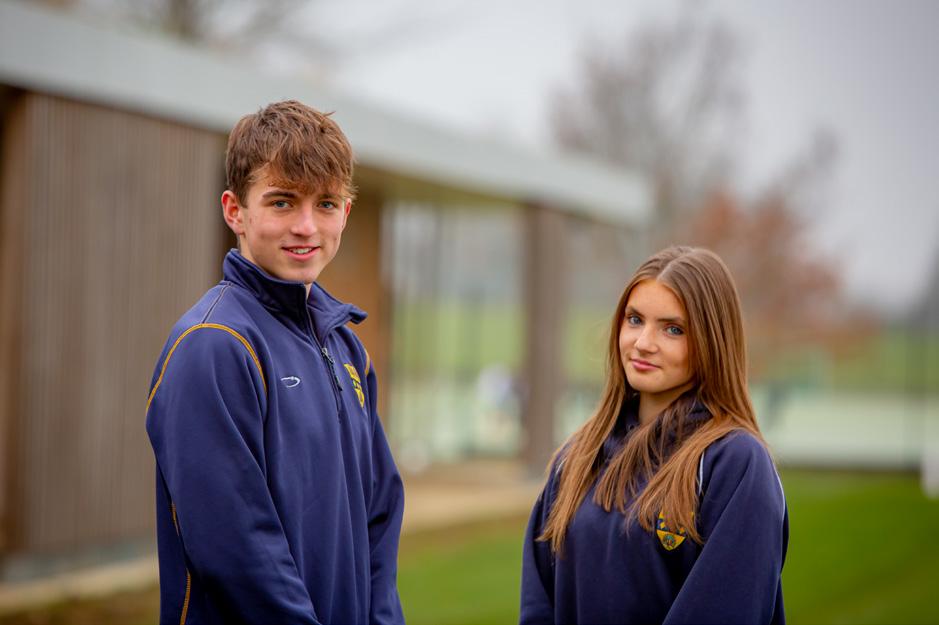
Ancient Greek AOB
The Ancient Greek AOB group have been working on their translation skills. Below is what they have been working on.


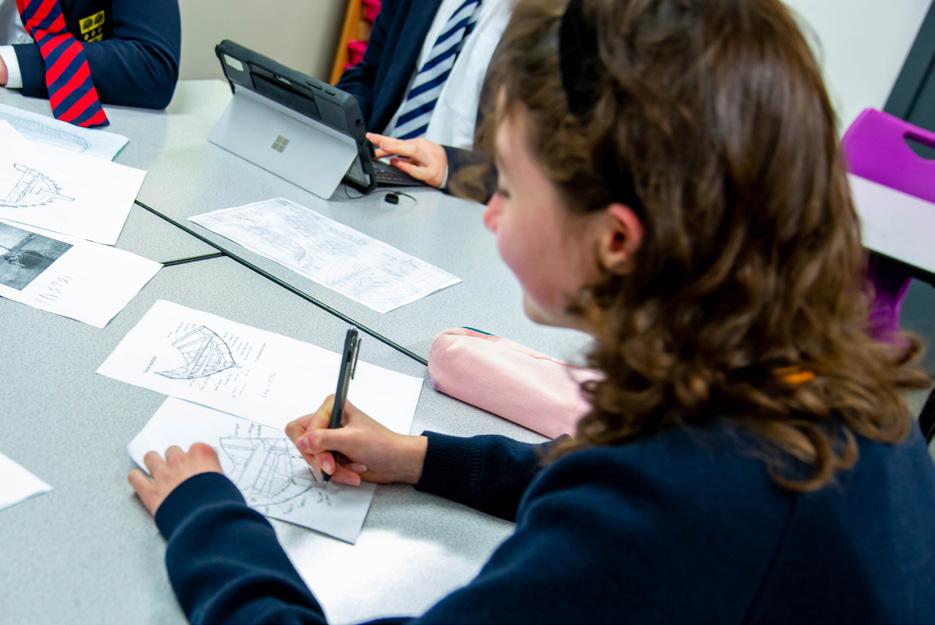
History Refecta
Socrates and the Philosophers
A visiting stranger asks an Athenian citizen about the famous philosopher Socrates, who was Plato’s teacher and inspiration.
Stranger: But what sort of man is the philosopher?

Athenian: It is clear that he is a lover of wisdom. For philosophers wish both to find and understand wisdom.
Stranger: And to teach it?
Athenian: Yes they wish also to teach it.
Stranger: And to be admired?
Athenian: Yes it is clear that some of them wish to be admired.
Stranger: But what is the wisdom being taught by the philosophers?
Design in Minecraft

Athenian: There are many philosophers and many ideas. For on one hand, some say that everything is made out of earth, but on the other hand, others say that it is air, or fire or water…
Stranger: And others say that the moon is not a goddess but a clump of earth.
Athenian: Socrates, however, speaks not about the earth and the sky, but about the life of human beings. For he says that philosophy is in relation to ignorance, just like life is to death. For everything is examined by philosophers. For the unexamined life is not worth living.
17
Language
Sign
TREASURE ISLAND
The Michaelmas Term Production of Treasure Island was yet another outstanding performance from our talented pupils. From its romping sea shanties to its dark brooding atmosphere of menace, this show was packed with excitement and wonderfully charismatic performances.



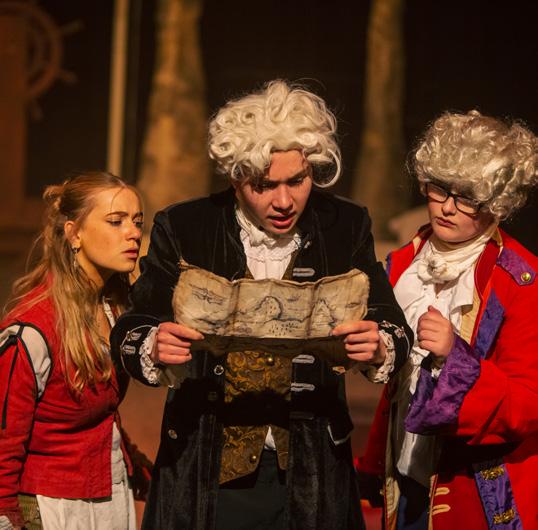
There are too many individuals in the cast to name them all, but particular mention must be made of Oscar (Fifth Form, Vanbrugh) and Xander Luckett (Second Form, Vanbrugh) as two terrifying pirates with a death feud. Henry Cook (Fifth Form, Harcourt) was the epitome of noble duty as Captain Smollett, Darcey Snaith (Fourth Form, Harcourt) fearful and violent as Black Dog and Adam Rees (Fifth Form, Queen Anne) hilarious as the oft ignored Grey. The wonderful double-act of Jamie Wehrle (Upper Sixth, Queen Anne) as Doctor Livesey and Monty Bolton (Fifth Form, Vanbrugh) as Squire Trelawney provided many laughs and they were exemplary in their professionalism. Dylan Morris (Upper Sixth, Vanbrugh) was wonderfully expressive as the marooned Ben Gunn and Bella Caffyn (Lower Sixth, Vanbrugh) provided a terrific antagonist in her depiction
of Long John Silver. Marni Cox (Upper Sixth, Vanbrugh) was exceptional as the hero Jim Hawkins, as she skilfully and endearingly steered the audience through this thrilling tale with a beautifully nuanced and authoritative performance.
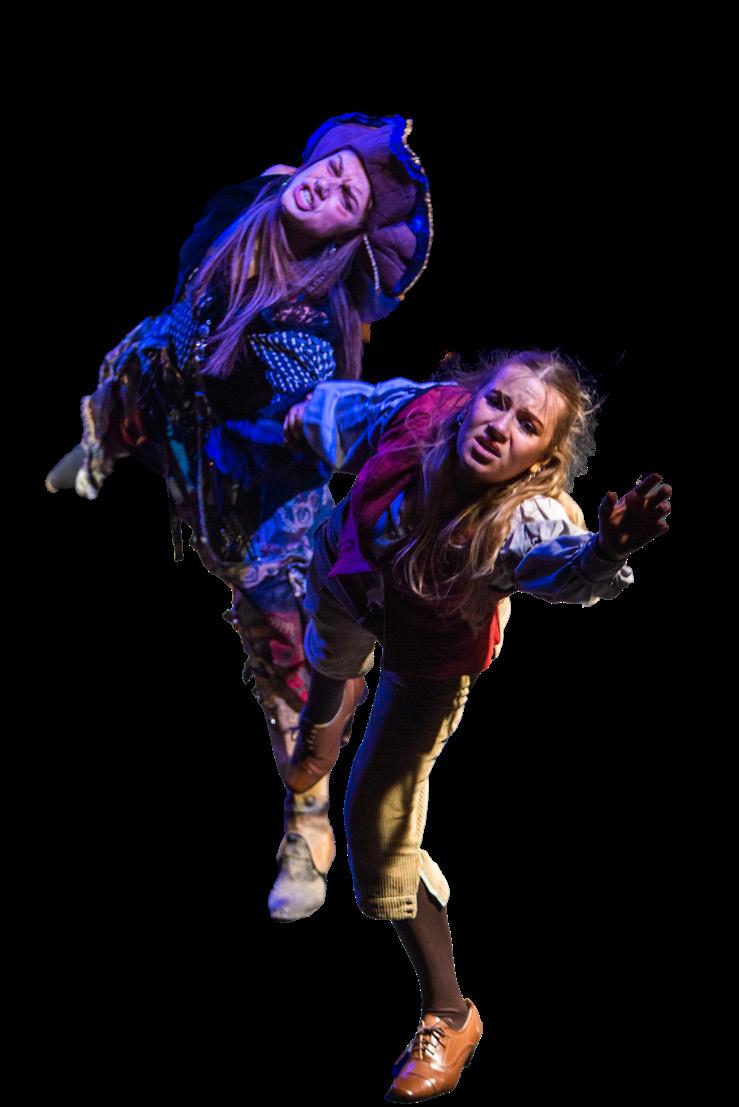
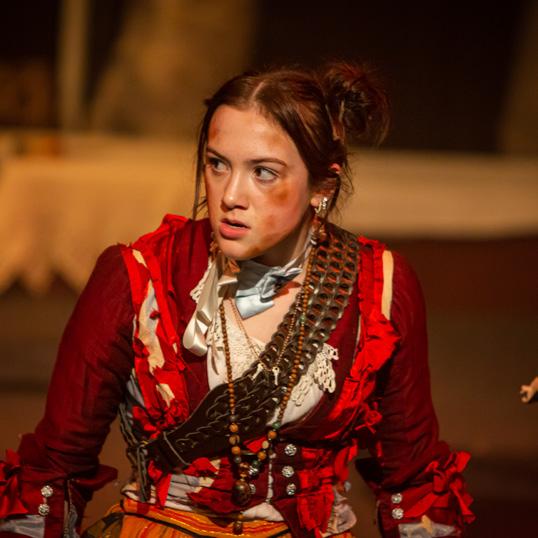
There were many superb performances from the talented ensemble, as well as the charismatic and hilarious pirates, all ably supported by an excellent stage-crew and marvellous sea shanty band. The costumes were beautiful and marvellously detailed, quite the best we have ever seen, and we look forward to the next thrilling adventure on the Cokethorpe stage.
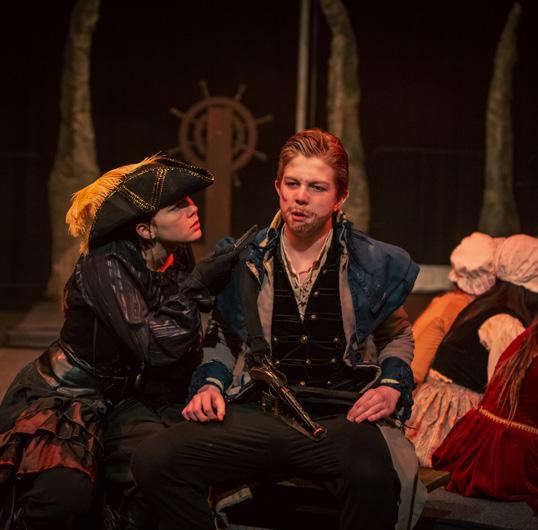
18
What do you do at the School?
I am a Modern Foreign Languages (MFL) teacher and I also coach hockey in Games.
When did you join?
I started at Cokethorpe in April 2021.
What are your interests outside of School?
Growing up in Northern Ireland, hockey was a huge part of school life and I have carried that through to this day where I currently play at Oxford Hawks Hockey Club. I love sports in general and enjoy playing badminton and tennis. Outside of sports, I was once quite a musical child so every so often I like to play the piano and sing, although it is safe to say I have somewhat lost my touch!
Why do you think sport is important to pupils in education?
Starting sports from an early age allows you to build a passion for a sport and it becomes ingrained in you when you are older, which was certainly the case for me. I think team sports are important in terms of building friendships and working in a group setting. Sport is amazing not only for your physical health but also your mental health.
Where does your passion for languages come from? How many languages do you speak?
As well as English, I speak Spanish and French (and the odd word in Irish). I grew up spending a lot of time in France with my family and that is where my love for languages and different cultures began. I had an amazing teacher in secondary school who taught me both French and Spanish and his love for languages was so evident, it had a real impact on me. I love learning about different cultures, traditions, gastronomies and think it is an important skill to be able to speak another language in today’s world.
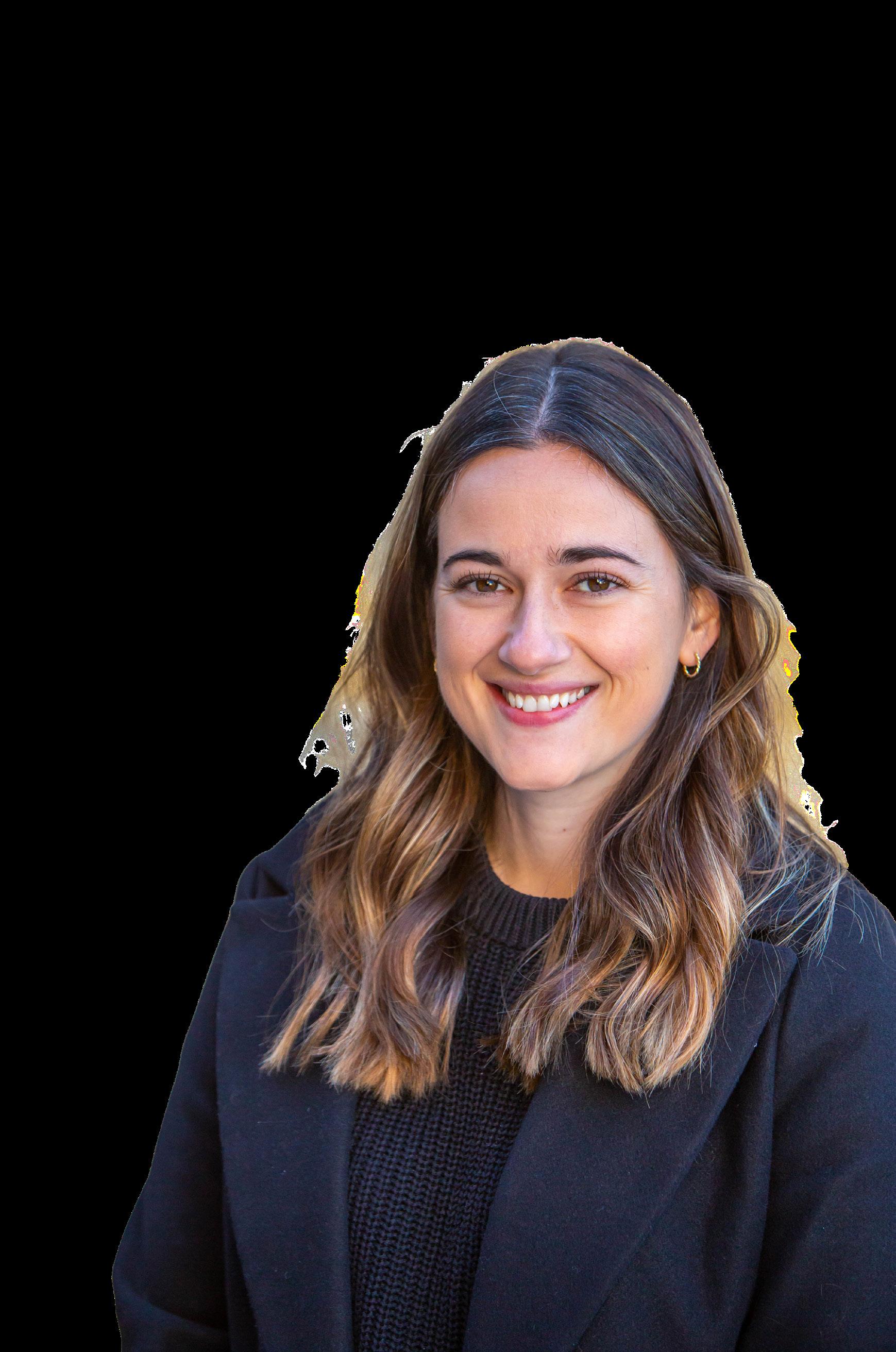

What is your favourite aspect of school life at Cokethorpe?
House events at Cokethorpe are a great way of bringing pupils together. The variety of House competitions that take place throughout the year allows all pupils to take part and to excel in their own areas of interest.
MEET THE SCHOOL - MRS MOORE
COKETHORPE CREATIVITY
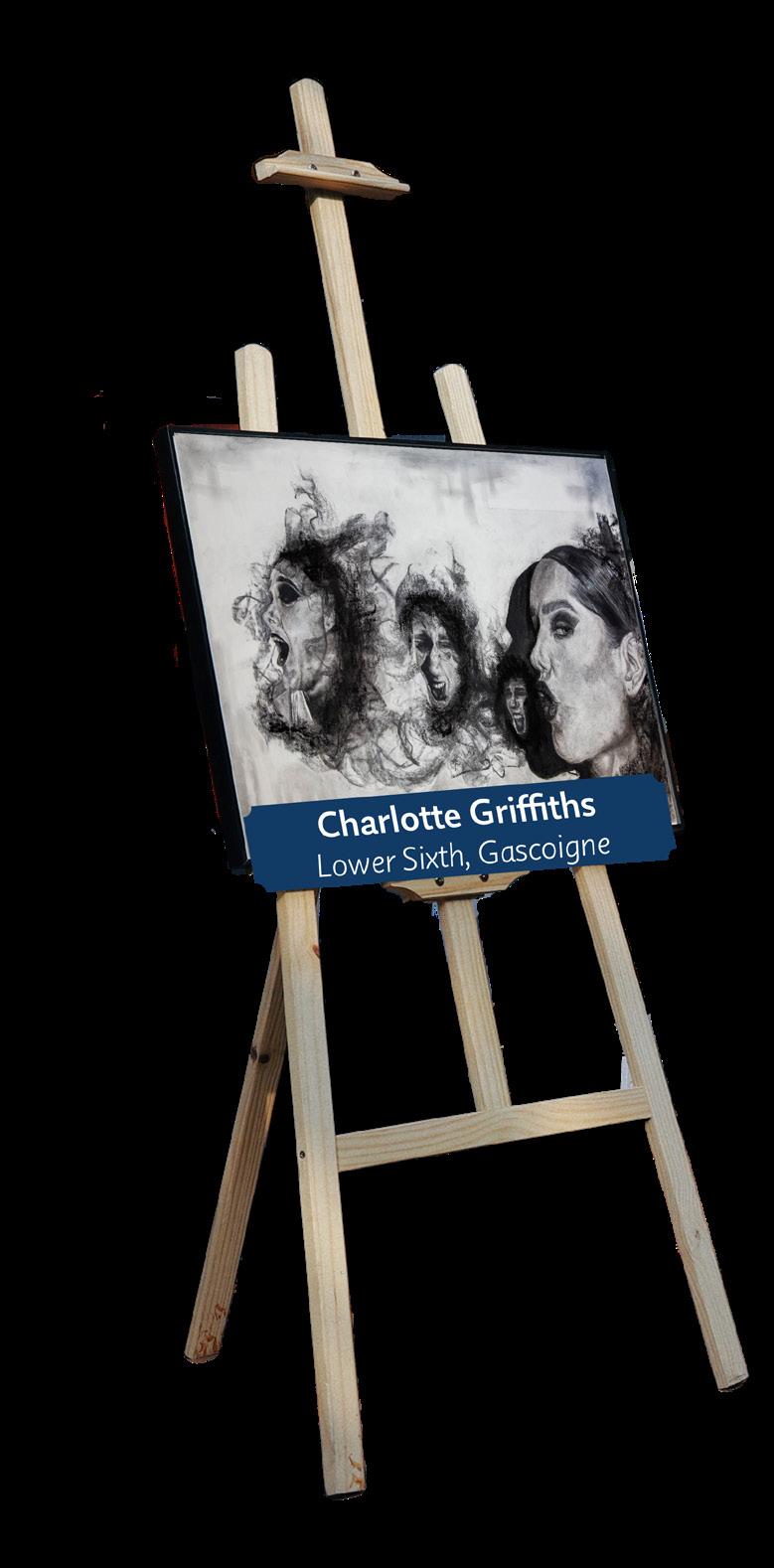


 Nina Larsson Second Form, Queen Anne
Amelia Younger Second Form, Feilden
Pippa Allen Fourth Form, Harcourt
Audrey McCormick Third Form, Vanbrugh
Amelie Boyle Third Form, Harcourt
Ella Sharp Third Form, Vanbrugh
Rosie Doland Fourth Form, Vanbrugh
Felt Cacti by Year 6 pupils
Nina Larsson Second Form, Queen Anne
Amelia Younger Second Form, Feilden
Pippa Allen Fourth Form, Harcourt
Audrey McCormick Third Form, Vanbrugh
Amelie Boyle Third Form, Harcourt
Ella Sharp Third Form, Vanbrugh
Rosie Doland Fourth Form, Vanbrugh
Felt Cacti by Year 6 pupils
MEET THE SCHOOL - MRS COOPER
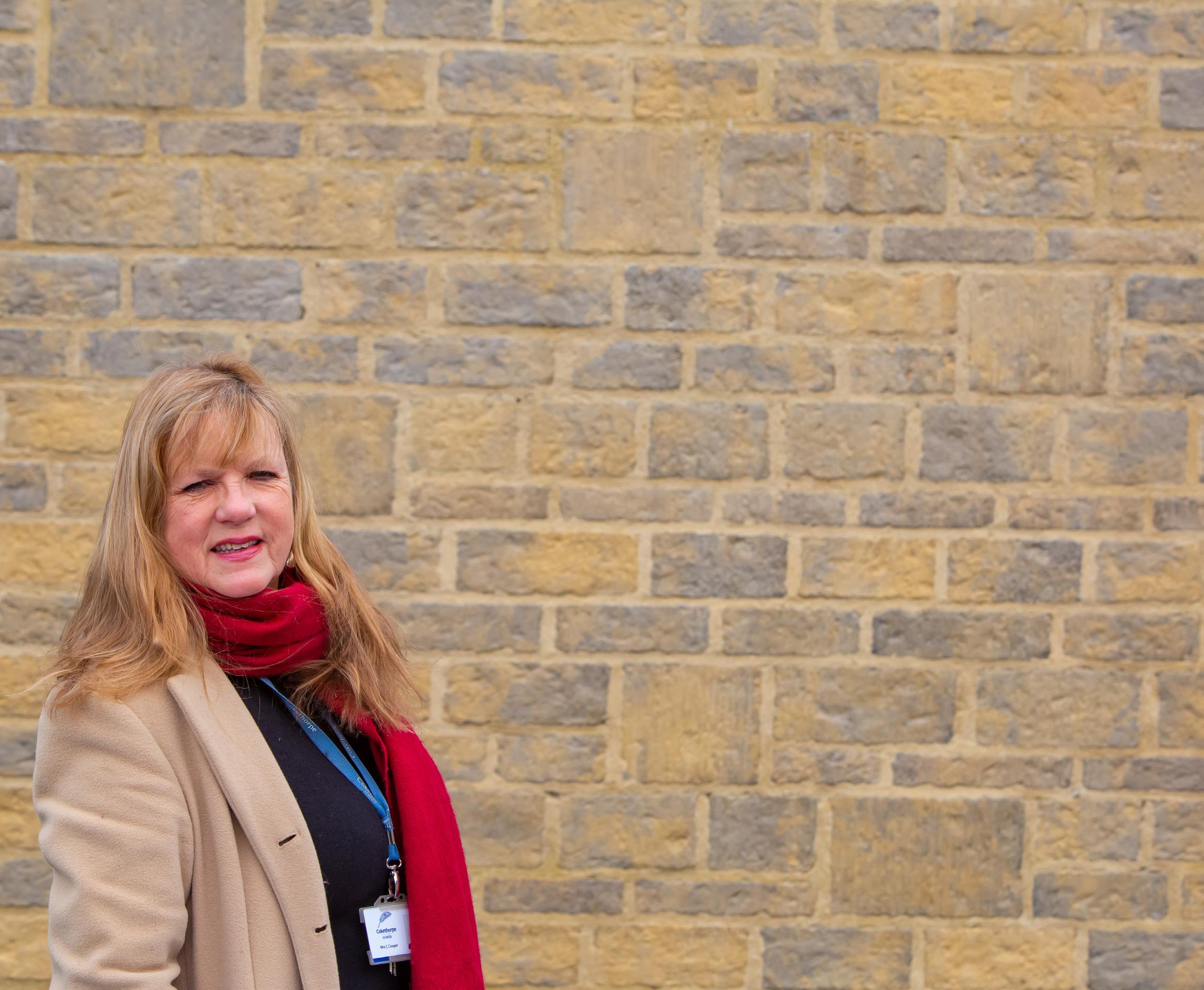
What do you do at the School?
I teach LAMDA (London Academy of Music and Dramatic Art). I run classes for pupils aged nine to eighteen years old, from Grade 1 to Grade 8. Grades 6, 7 and 8 are Bronze, Silver and Gold and can be converted to UCAS points. These grades can be taken in Acting, Speaking Verse and Prose and Public Speaking. I am also a LAMDA examiner.
When did you join?
I joined Cokethorpe in 2012.
What is LAMDA?
LAMDA is a drama school that has existed in London for over 150 years. The president is Benedict Cumberbatch, who studied there amongst many household names. The school runs various drama related degree courses, including acting, directing and producing.
What did you do before joining Cokethorpe?
I trained in Drama and Art, but before training as a teacher, I was working in TV as a set designer. I then taught drama, art and media studies at Wheatley Park School in Oxford. I also set up and ran a children’s theatre group called Kidsplay at the Pegasus Theatre in Oxford for ten years. I directed a production of Winnie the Witch working with Korky Paul who illustrated the books of the same name, he also designed the sets.
Why would you recommend LAMDA to pupils?
LAMDA is wonderful for building confidence and creativity as well as learning about how much fun the theatre can be. It is also fantastic for working on performance skills.
If you were not tutoring LAMDA, what would you be doing?
I could be teaching Art and be a children’s book illustrator. I am also trained in silversmithing and have sold lots of handmade silver jewellery over the years so I could be a jewellery maker.
Tell us something we do not know about you
I used to present an Arts programme on local TV. I have been in a film with Billy Connolly and also appeared in an episode of Inspector Morse
LAMDA RESULTS
LAMDA Level 1 Award in Performance
Bobbie Hunt (Year 6, Symonds) Grade 3 – Duo - Distinction
Lottie Bayliss (Third Form, Gascoigne) Grade 3 – Duo - Distinction
Darcy Atkinson (Year 6, Baker) Grade 3 – Duo - Distinction
Elsa Linehan (First Form, Swift) Grade 3 – Duo - Distinction
Emmeline Black (Second Form, Feilden) Grade 3 – Solo - Distinction
Freya Richards (Year 6, Lockwood) Grade 3 – Duo - Distinction
Grace Clear (Third Form, Gascoigne) Grade 3 – Duo - Distinction
Iona Mettrick (Year 6, Gwyn) Grade 3 – Duo - Distinction
Lara Hancox (Second Form, Harcourt) Grade 3 – Duo - Distinction
Megan Batchelor (Second Form, Harcourt) Grade 3 – Duo - Distinction
Pearl Geraghty (Year 5, Gwyn) Grade 2 – Solo - Distinction
Seoyeon Lee (First Form, Harcourt) Grade 3 – Duo - Distinction
Zoe Cameron (Second Form, Queen Anne) Grade 3 – Solo - Distinction
LAMDA Level 2 Award in Performance
Connie Quartley (Third Form, Swift) Grade 4 – Duo - Distinction
Felix Waters (Fifth Form, Queen Anne) Grade 5 – Solo - Distinction
Hannah Smith (Second Form, Gascoigne) Grade 4 – Duo - Merit
Hattie Hunt (Second Form, Gascoigne) Grade 4 – Duo - Merit
Megan Hunt (Second Form, Vanbrugh) Grade 4 – Solo - Distinction
Millie Cross (Second Form, Harcourt) Grade 4 – Solo - Distinction
Rosie Pickering (Third Form, Harcourt) Grade 4 – Duo - Distinction
Zachary Wheeler (Third Form, Harcourt)
Devising Drama Grade 5 – Solo - Distinction
LAMDA Level 3 Certificate in Performance
Alex Hughes (Fourth Form, Swift) Grade 6 - Solo - Bronze Medal - Merit
Amy Goodgame (Fifth Form, Feilden)
Grade 7 - Solo - Silver Medal - Distinction
21
STEM Week made its periodical return to the equation this month with a theme of ‘Race to Rescue’. There were many elements to the activities this year, which included: the Tutor Group Challenge, creating a balloon-powered racing car; the DT

mission, sending and receiving an encrypted message in Morse Code, making a winch mechanism to rescue survivors from the bottom of a cliff; whilst the ever-popular Slime Workshop was a messy masterpiece of gunky activity. The Third Form even engineered a ‘bank heist’, tackling a series of questions to part a vault from its cash!
Challenge, which called on pupils to design their own solution to cleaning up plastic pollution from the world’s oceans; whilst a series of code-breaking tasks ran throughout the week.
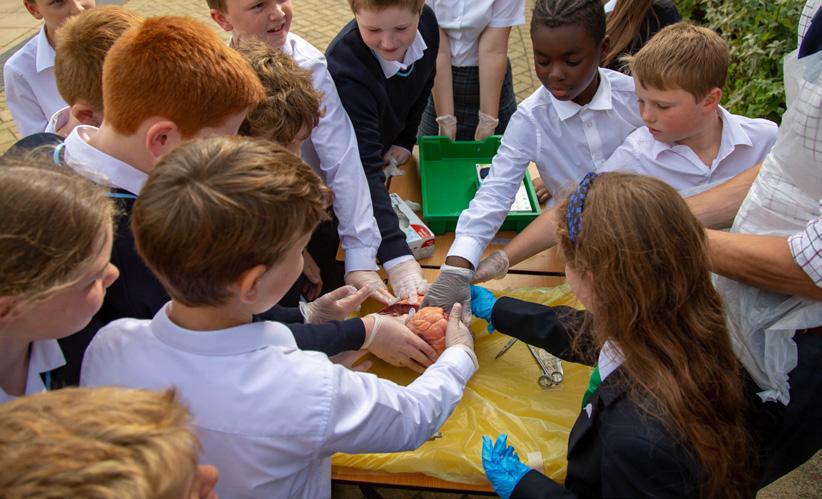
Elsewhere, the First Form visited Bletchley Park and came up with some innovative solutions for redesigning the humble toaster as part of the New Product Design Challenge. The Second Form embarked on a ‘Code and Rescue’

The STEM Fair was met with great enthusiasm as pupils were able to try different STEM-related activities; Prep School pupils were particularly intrigued by the opportunity to look inside and handle a cow’s heart!
As part of the array of activities organised during STEM week, a group of Scholars from the Second Form to Fifth Form visited the New Scientist
Live Exhibition in the Excel Centre. The day allowed the pupils to explore the many interactive and informative exhibitions from leading scientists and universities. Some of the many highlights from the day included the Fifth Form experiencing rollercoaster rides via VR headsets and one of our pupils performing keyhole surgery. During the course of the day, the pupils attended lectures of their choosing which varied from ‘Bang! The science of explosions’ and ‘Hack your brain, how to master revision and memory’ to ‘When T-Rex bites’. Throughout the day, the Scholars demonstrated great ambition and responsibility, taking full advantage of this fantastic opportunity.
ROYAL NAVY STEM DAY
It was an action-packed day for our Third Form who had the exciting opportunity to engage with the Royal Navy for activities focusing on developing their Leadership skills, whilst working through STEM focused tasks. They relied on their communication and teamwork skills to create practical solutions to a range of different problems, including a Royal Navy humanitarian aid scenario. Pupils were asked to design and build a communication tower to help get aid to affected areas following a hurricane.
Pupils also received a presentation from the team detailing what life is like in the ‘modern day Navy’ and pupils came up with some fantastic questions to ask the Navy team afterwards. An engaging and excellent day for our Third Form.

22
STEM WEEK
School News
Classic Motor Show
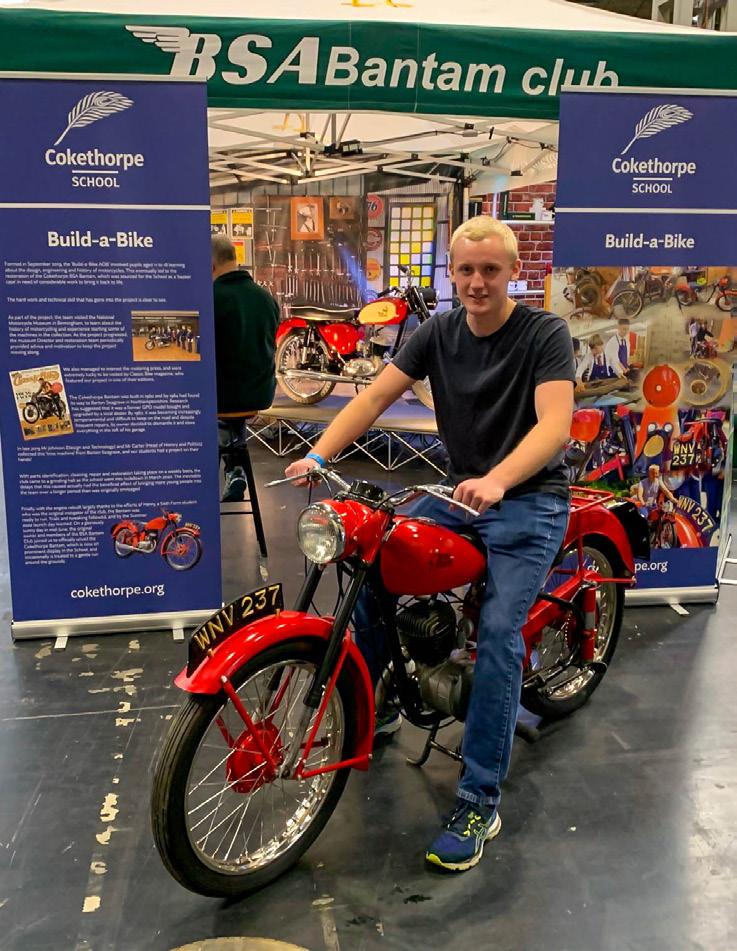
‘The launch of the Cokethorpe BSA Bantam after an extensive AOB restoration project was by no means the end of the story. The School has maintained its association with the BSA Bantam Owners Club, which invited us to display our machine at the prestigious Classic Motor Show at the NEC from Friday 11 to Sunday 13 November. The Club put our Bantam in pride of place, as part of their overall display of restored and gleaming bikes. Some of the pupils who were involved in the project over the past few years attended the show and talked to members of the public about the story of the project and their involvement in it. Henry Kerton (OC 2020, Gascoigne), who was the instigator of the project, was also on hand to talk through the technicalities of engine rebuilding, about the impact the project had on his interest in engineering and how it helped with his successful application for a degree-level engineering apprenticeship with a high-profile international company. The weekend was great fun and generated a great deal of interest in our AOB programme and the breadth of opportunities for learning that is available to our pupils.’
Mr S Carter
learn English, some Nepalese songs and how to greet people in Nepalese. The charity aims to improve life and education in Nalang and surrounding rural areas.

Q&A with Nicolas Sirkis from Indochine
Theatre Trip to Bugsy Malone
The Yearley Trust Visit

On Wednesday 9 November, we were delighted to welcome two guests from the Yearley Trust to the School. The founder of the Trust, John Yearley, and Pooja Silwal, a Nepalese teacher for the Trust, spoke to Fourth Form pupils about life in Nepal and the work the Trust does with children in Nepal. Year 3 pupils were taught some of the rhymes they use in Nepal to
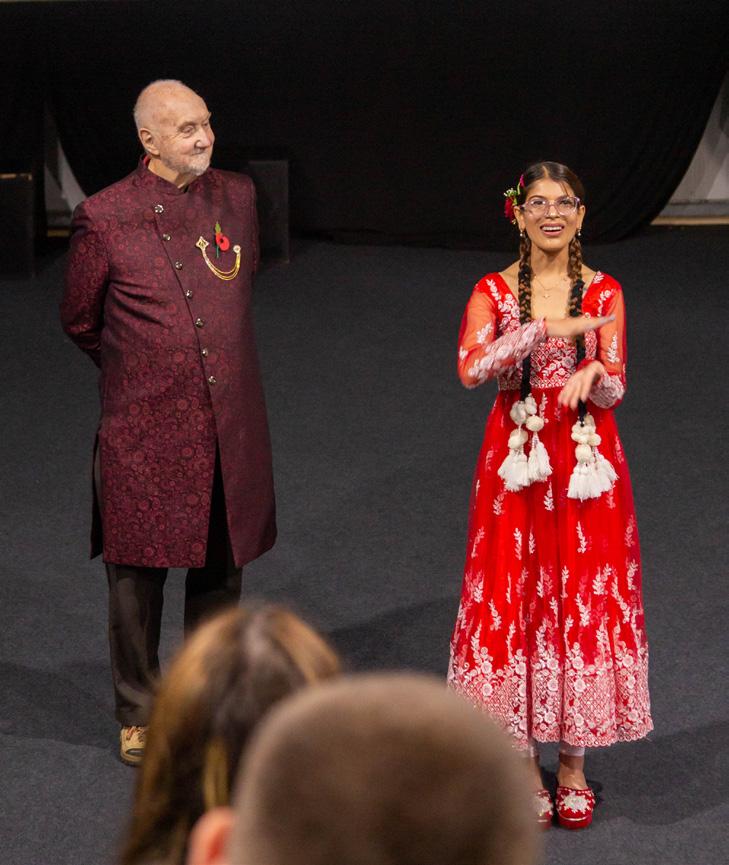
A group of Upper Sixth students studying A Level French, went to Oxford on Friday 11 November to attend a Q&A session with Nicolas Sirkis, frontman and singer of the French rock band Indochine. Indochine formed in 1981 and a record 98,000 people attended their concert in May 2022 at the Stade de France.
‘The event was an opportunity for the students to discover a new style of music and to follow the evolution of this 1980s pop group that had a revival in the 2000s. Nicolas also talked about the way he writes music and lyrics, and about the singers who influence him.’
Second Form pupils visited the Oxford Playhouse to see a new and exciting production of Bugsy Malone, transferred from the original Lyric Hammersmith production. Cast entirely from young actors, who gave a panoply of superb performances, with an atmospheric set design and a selection of excellent songs, this was an enriching experience for our younger dramatists. Alongside accomplished characterisation skills from the youthful cast, our pupils enjoyed such favourites as Fat Sam’s Grand Slam, Tomorrow, Bad Guys, So You Wanna Be A Boxer, and for the finale of You Give A Little Love the audience were all on their feet dancing along. We hope that this experience of vibrant live theatre will inspire the Second Form to take bold steps in their onstage skills and characterisation.
Vets Evening
In the first full week of term
Dr Oldham hosted a Veterinary evening ‘So you think you want to be a Vet’. The evening was open to all; 44 schools from across Oxfordshire and Gloucestershire were invited. The evening provided accounts of what it is really like be a vet, drawn from personal experiences, both from Neil Patton, a Veterinary surgeon and lecturer at the Royal College of Veterinary Surgeons and Dr Oldham herself. An Old Cokethorpean, Hannah Berry, (OC 2019, Feilden) spoke about her life as a Fourth Year Vet student, offering helpful advice, and Chris Hobson, Head of Admissions at the Royal Veterinary College gave an invaluable and detailed presentation about the requirements of entry onto the course. It was an insightful and eye-opening evening into the working life of a vet.
Six Five Dinners
At the start of term, we introduced the Six Five Dinner Challenge to the students in the Lower Sixth. The idea was simple: in pairs of Houses, they were to plan, organise, budget and host an early evening dinner with entertainment for pupils in the Fifth Form and their parents. Inspired by The Apprentice, the challenge was a test of teamwork, leadership, imagination, organisation, initiative and – above all – flair; the result was three wonderful social events in the Dining Hall and Sixth Form Centre, organised entirely by students.

The first Six Five Dinner was hosted by the Lower Sixth of Feilden and Vanbrugh. With seventy-five in attendance, the theme was Autumnal Elegance and was accompanied by live music played on the clarinet and piano. The second was hosted by

Gascoigne and Harcourt with a Wild West theme. The highlight of the evening was a dance-off; we were all taught the moves to a line dance, and then, in groups, we staggered through head-to-head dance battles. The third and final Six Five Dinner was hosted by Swift and Queen Anne. The theme was Apres-Ski; where guests came dressed in their smartest salopettes and ski goggles.
The Six Five Dinner Challenge was a great project, enjoyed by all involved; it brought together the Lower Sixth, and it gave welcome to the current Fifth Form pupils and their parents, who – in only a few months’ time –will be calling the Sixth Form Centre their home. Above all, I learned the dance moves to Cotton-Eye Joe, which I am unlikely to forget.’
Mr E Tolputt
has been donated to such a fantastic charity.
We are also hugely grateful to the CPFA for the work they do for the School, over the last year they have raised well over £5,000 from the sale of uniforms alone.
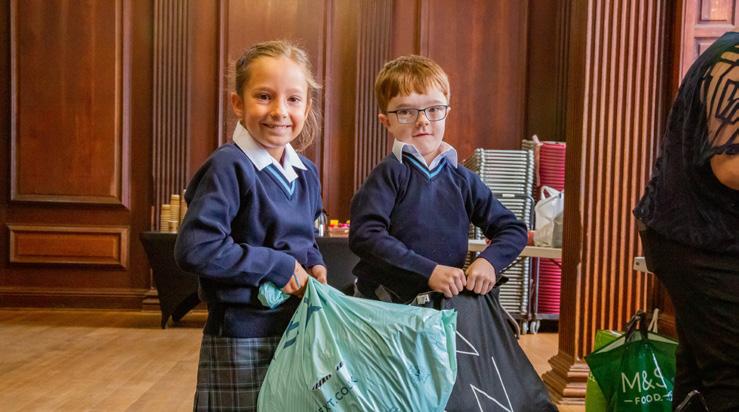
Mwangala Mwenda Foundation
The CPFA would like to thank our Prep School parents for their generous donations of old School uniform. The uniform was donated to the Mwangala Mwenda Foundation, which primarily provides practical, educational and financial support to around 1,000 children at schools throughout the Kalabo District in the Western Province of Zambia. The quantity of clothes donated is enough to provide school uniforms and sports kit for single year groups across three of the schools the charity supports. We are thrilled that the old uniform
Enlightenment Lecture

The first Enlightenment Lecture of the year’s series came from Dr Chris Fuller, University of Southampton. Entitled ‘The rise of social media, the birth of surveillance capitalism, and the theft of our future tense’, Dr Fuller provided an insight into how our data is harvested and the tremendous financial gains that this intelligence has for the IT monopolies of Silicon Valley.
The lecture highlighted the darker side of such companies’ policies, and just how significant their collection, then sale, of individuals’ data is. Using their vast databases and predictive technologies, IT companies such as Google, Amazon, Spotify, and Facebook are able to direct our futures. This was a fascinating lecture which was well-received by a very engaged Sixth Form.
Hockey Success
Huge congratulations to our First XI Hockey team following their incredible victory at the U18 County Hockey Tournament. The squad travelled to Oxford Hawks Hockey Club in north Oxford to compete against the best teams in Oxfordshire with the typical high standard of play you would expect from a tournament at this level. The squad started off well, with a deflected cross in the first four minutes giving them early points on the board. The outstanding talent in this team was evident throughout as they continued to dominate the tournament, scoring ten goals and only conceding two.
Congratulations to all the players, who demonstrated the strength in depth across the team, including impressive performances from a number of promising U16s. The future is certainly bright for this group of hockey players.
Colour Run and 24-hours of Sport
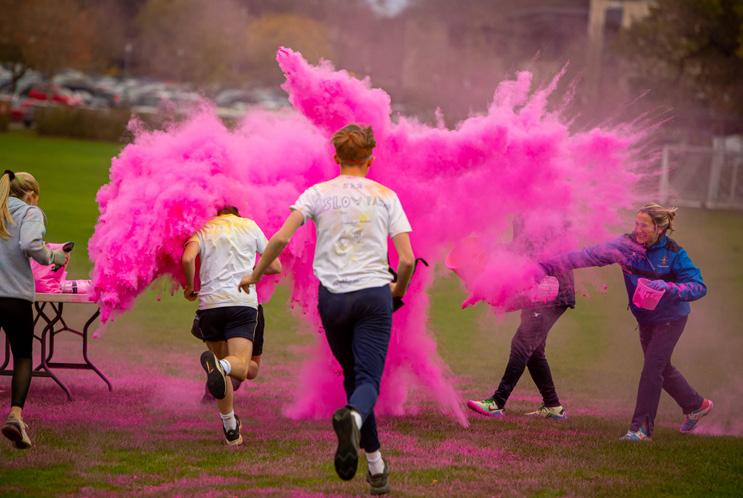

The School was transformed into a rainbow of colour as pupils from First Form to Sixth Form ran a 5km route around the School grounds raising money for the Charity ‘Sport in Mind’. Staff took much delight in throwing different coloured powder at the participants as they walked, jogged or ran the course. There were beaming smiles and a palpable sense of joy as pupils crossed the finishing line covered from head to toe in colour (as were those ‘enthusiastic’ teachers who threw the powder). The Colour Run launched the next fundraising event - 24-hours of sport - which was also organised by Lower Sixth student Alice Smith (Swift).
Following the success of the 24-hour charity football match last year, Alice
convinced a group of Fifth and Sixth Form pupils to join another ambitious fundraising event - a 24-hour rotation of different sports throughout the night, including cross-fit disco and basketball. It was a Herculean effort from the pupils involved and the staff who stayed the entire night. Special thanks go to Mr Robinson and Mr Hughes, and the Headmaster himself who came to take part in a table tennis match at midnight. We are delighted to announce that Alice and her helpers have raised an incredible £1,540.41 so far. If you would like to donate to this wonderful charity, please follow the JustGiving link below:
www.justgiving.com/fundraising/ cokethorpeincolour
an impressive three-part round made this an unforgettable Harvest celebration, whilst delivering an important message to our youngest pupils.
Little Red Hen
The Pre-Prep children celebrated Harvest Festival in their usual spectacular fashion, with their wonderful performance of The Little Red Hen. The performance began with Year 1 pupils dressed as farmers, talking about gathering the harvest, followed by Year 2 recounting this tale as the narrators. With fantastic performances from our little red hen, the dog, the cat, and the duck; not to mention the Reception Class as the wheat!
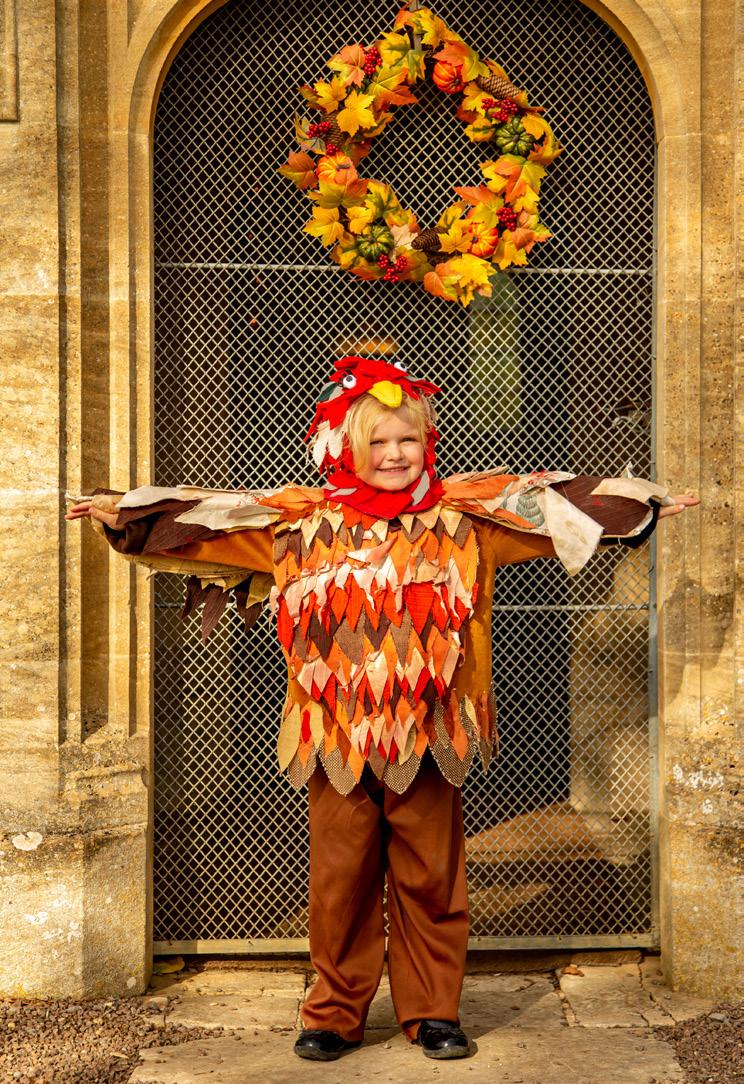
The story of the hard-working hen had a lovely ending, with the kind hen sharing her bread, despite not being helped by the other animals. A little help from our Pre-Prep choir singing
Sports Dinner
On Thursday 24 November, our third Sports Dinner was held in the Dining Hall. Well over 100 guests attended to listen to guest speaker James Haskell and take part in a fun rugby themed event and auction. Guests were treated to a delicious three course meal provided by the Catering Department, as well as an entertaining Q&A with James Haskell hosted by Mr Sheer. Proceeds from the evening were divided equally between the charity Buttle UK and the Cokethorpe bursary fund.
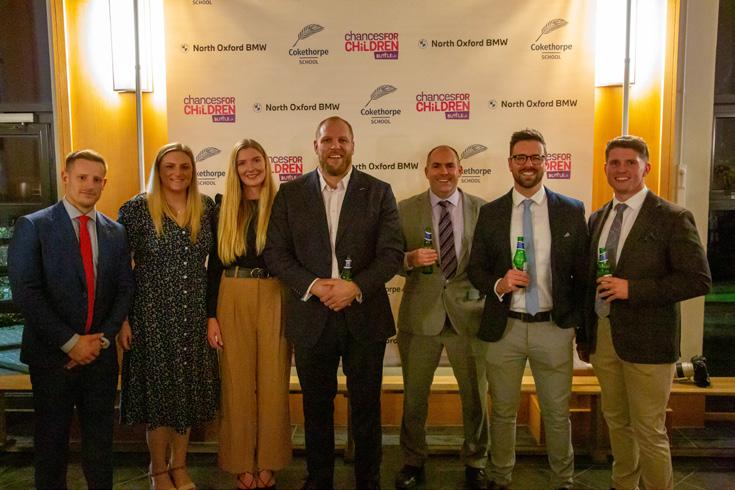
Biology Bake Off
This term saw the return of the ‘Biology Bake Off’ where pupils were tasked with baking something that represents biology, the science of life. The entries were judged on creativity, originality and accuracy, and their creations certainly did not disappoint. The winner was Rohana Saunders (Lower Sixth, Queen Anne) for her amazing and interactive heart cake complete with with fatty deposits. Runners up were Rachael Elliott (Lower Sixth, Feilden) with her food chain cake and Anna Pratley (Lower Sixth, Feilden) for blood donation cupcakes. Dr Steventon also received a commendation for a delicious lemon buttercream spine!
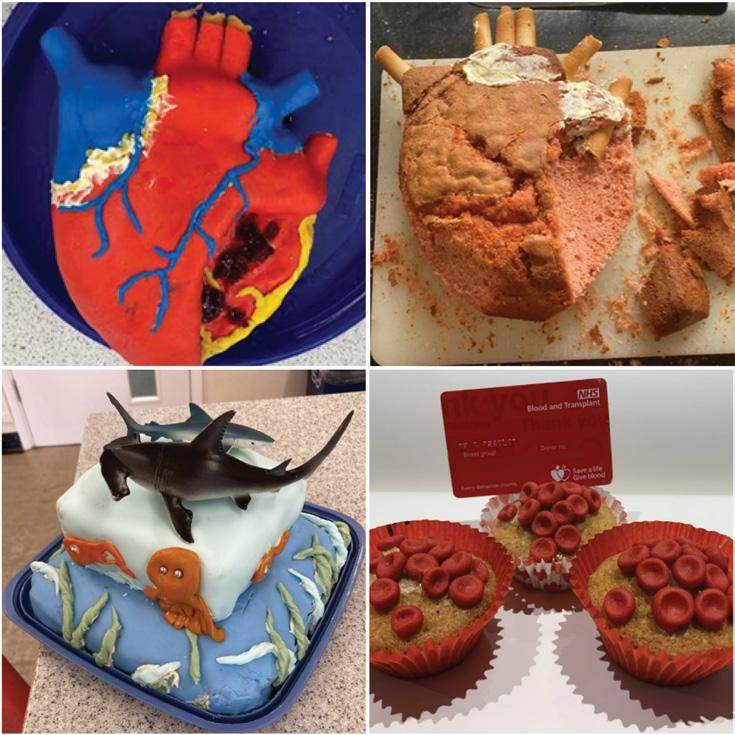
the movement of the flames. Pupils then used this as a stimulus for their own descriptive writing about the fire. Some beautiful passages of descriptive writing were produced even though it was a bit chilly!
Queen Anne), Charlotte Griffiths (Lower Sixth, Gascoigne), Gabriella Hancox (Lower Sixth, Harcourt), Tara Lockhart (Lower Sixth, Harcourt), Rafi Layish (Lower Sixth, Vanbrugh), Dylan Morris (Upper Sixth, Vanbrugh), Ben Orton (Upper Sixth, Swift), Rohana Saunders (Lower Sixth, Queen Anne), James Stiger (Lower Sixth, Swift), and Marit Tweehuijsen (Lower Sixth, Feilden) participated in the Oxford Global Model United Nations Competition, which pitted them against schools from across the UK, as well as countries as wide ranging as France, Germany, India, Peru, and China.
History Lecture
On Thursday 20 October, Mr Blank delivered the first of this year’s History lectures on the subject of Hereward the Wake, entitled ‘The Last Englishman’. Mr Blank delivered a fascinating, entertaining and, at times, whimsical presentation on the life and times of this infamous Anglo-Norman rebel. This was the first in the annual series of History lectures, which are a showcase for the expertise of the School’s History teachers, and an opportunity for pupils to explore historical subjects that are not covered by the curriculum.

English Lesson in the Woods
As part of their work on Dickens’
A Christmas Carol, Second Form pupils have been writing their own descriptions of imagined mean characters and the weather. To develop their descriptive writing, some pupils visited the woods to look more closely at the world around them and use this to inspire their writing.
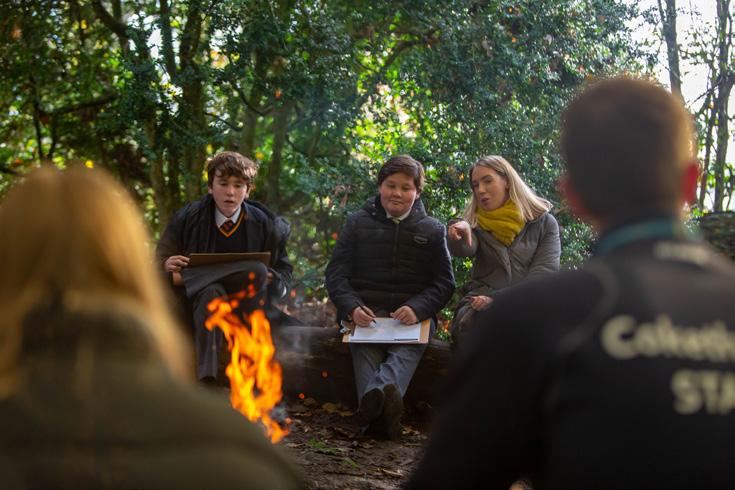
Particularly, they took time looking at the fire: the feelings and memories it evoked; the contrasting textures present; the range of colours; and

Model United Nations
This year, the Sixth Form revived the Cokethorpe Model United Nations Team, which had been in abeyance since before the pandemic. Students, Joe Charlesworth (Upper Sixth, Queen Anne), Rachael Elliott (Lower Sixth, Feilden), Iman El-Megrisi (Upper Sixth,
Most teams spent a year or more preparing for this competition, where delegates must be able to use diplomatic negotiating skills to communicate their well-researched solutions to global problems. Our delegates competed against each other and 92 other delegations on the Disarmament and International Security Committee. While all our delegates did extremely well, building and leading coalitions, delivering 90-second impromptu speeches, negotiating solutions, and using parliamentary procedure, special recognition should be given to Rafi Layish (Lower Sixth, Vanbrugh) who, out of the 104 delegates present, was given the award for Outstanding Delegate—the equivalent of second place—in this competition. We are already looking to future competitions, in the UK and abroad and will be expanding the programme to include the Fifth Form.
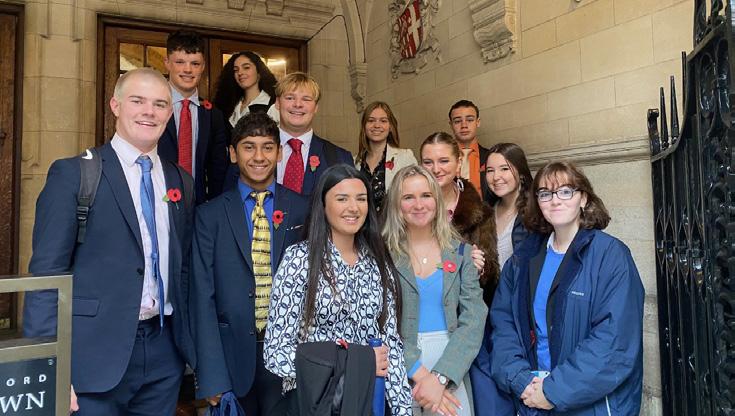
Pre-Prep Nativity
Expectations are always high for the Pre-Prep Nativity, and when it comes to setting a mood of reverence or exuberance, this year’s Pre-Prep performance, Baarmy Bethlehem, unapologetically opted for the latter.

A trio of party loving sheep named Rascal, Cheeky and Scamp, played by Etta Jennings (Year 2, Baker), Lorenzo Dodd (Year 2, Baker), Hunter Everson (Year 2, Symonds) were in search of a big celebration. When they saw Bethlehem filling up, they assumed it was for a big party, but could not find one.
(Reception, Gwyn) and the donkey, Oliver Beechey (Reception, Baker) the party sheep finally got their wish.
Pre-Prep certainly entertained their appreciative audience and really proved that their standard of acting, singing, and dancing was exceptionally high.
 Ms S Du Feu
Ms S Du Feu

Confidence’. Team A’s Chairperson and Questioner then hosted a speaker from the Oxford International College regarding the UN response to the migrant crisis.
The familiar story was eloquently read by the Year 2 Narrators, Harriet Oldham (Gwyn), Reggie Firth (Baker), Olivia Curto (Lockwood), and Woody Heaton (Gwyn) which gambolled through all the essential nativity elements such as the brilliant Star played by Ruby Jennings (Reception, Symonds). Some fabulous performances from our Year 1 children, the serene Angels, Phoebe Mardle (Symonds) and Emmy Theyer (Lockwood), amusing Shepherds Ben Crumlish (Symonds) and Charlie Laight (Lockwood) and The Wise Men, Forest Neal (Gwyn), Ollie Younger (Symonds) and Eliam Gounongbe (Lockwood), all that our woolly heroes really cared about was finding a noisy celebration. After paying their respects around the crib with Mary played by Kamiyah Muldrow (Reception, Lockwood) and Joseph played by Toby Freeman
Years 3 and 4 Christmas Play
It was then the turn of our fabulous Year 3 and Year 4 pupils to share their talents with an appreciative audience as they performed their Christmas Production, The Night Before Christmas. The scene was set perfectly in the beautiful setting of our Chapel by candlelight on a truly bleak midwinter evening.
The pupils brought warmth with their entertaining and confident performances – from the little sleeping mouse to a very jolly St Nick! The dancing reindeer executed their choreography brilliantly, and parents were treated to a rousing rendition of We Wish You a Merry Christmas before venturing back out into the cold night, feeling a touch more festive!
ESU Public Speaking Competition
The Cokethorpe Public Speaking AOB entered two teams into the first round of the ESU (English Speaking Union) Public Speaking competition and had much to celebrate. Proceedings began for Team A with a speech exploring a feminist take on the title ‘We Lack
It was then the turn of Team B’s speaker with a speech entitled ‘Latin and Greek should be offered in all schools’, before the remaining team members questioned a speaker from Magdalen College School on the potential future collapse of capitalism. Our pupils conducted themselves with great poise under pressure and an impressive display of eloquence and intellectual curiosity. Both teams secured progression through to the second round and we wish them luck for the next heat in February.
Visit to the British Museum
A visit to the British Museum provided inspiration for our Fifth Form Latin GCSE pupils as they explored statues, monuments and artefacts from ancient Greece and Rome. The morning was spent in the Roman rooms, examining the portraits of the Emperors (especially Augustus) and the Roman Gods.
After lunch, the pupils visited the ancient Greek artefacts, including the stunning red-and black-figure vases, the impressive Nereid monument, and the controversial Parthenon Sculptures. These exhibits gave form to many ideas they have encountered in their Latin lessons and their set texts, and will help them to visualise the Classical world in future.

PUPIL PERSPECTIVES - DUNGEONS AND DRAGONS AOB
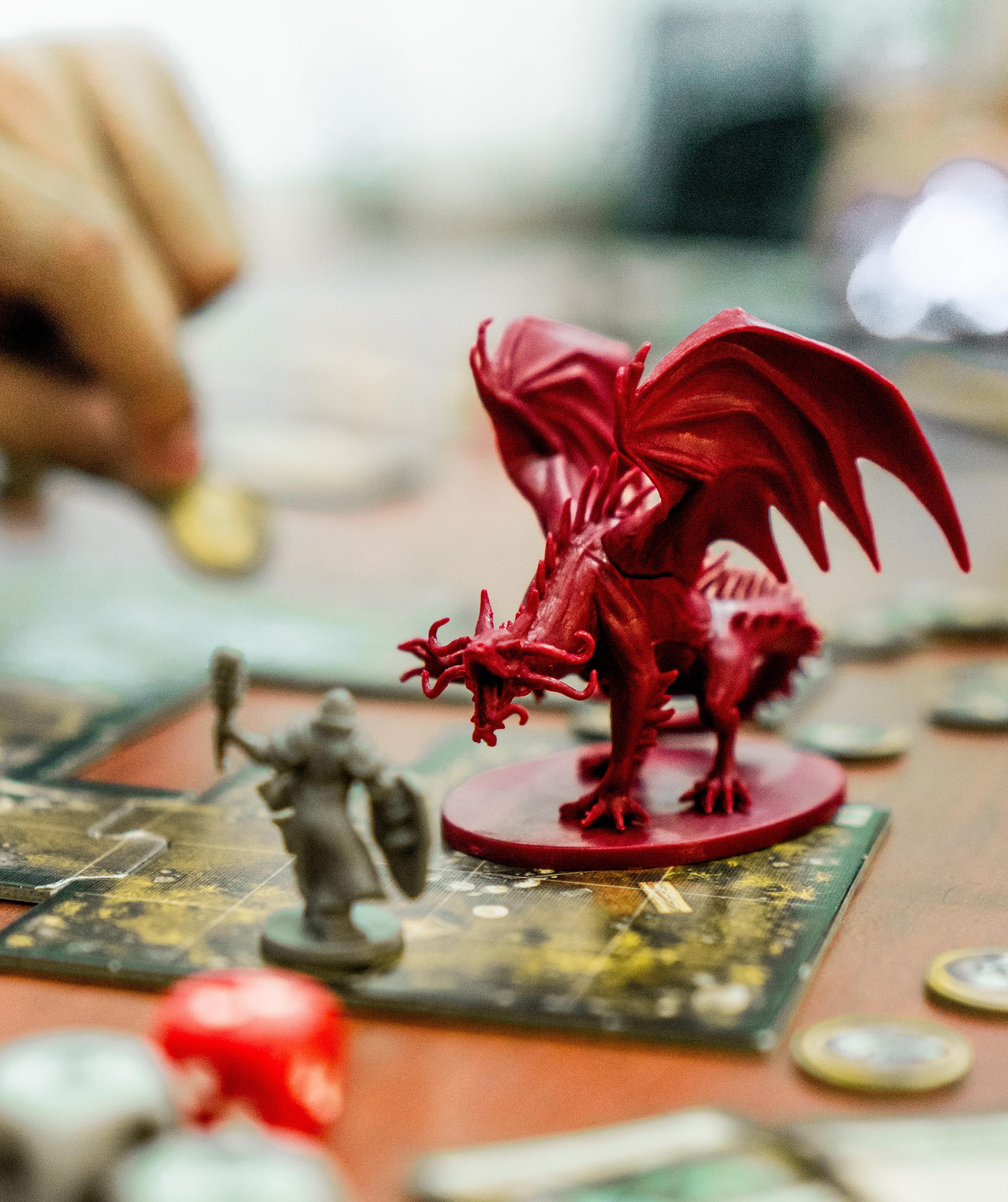
Morgan Thomas (Lower Sixth, Queen Anne) spoke to us about the AOB he set up and ran – Dungeons and Dragons.
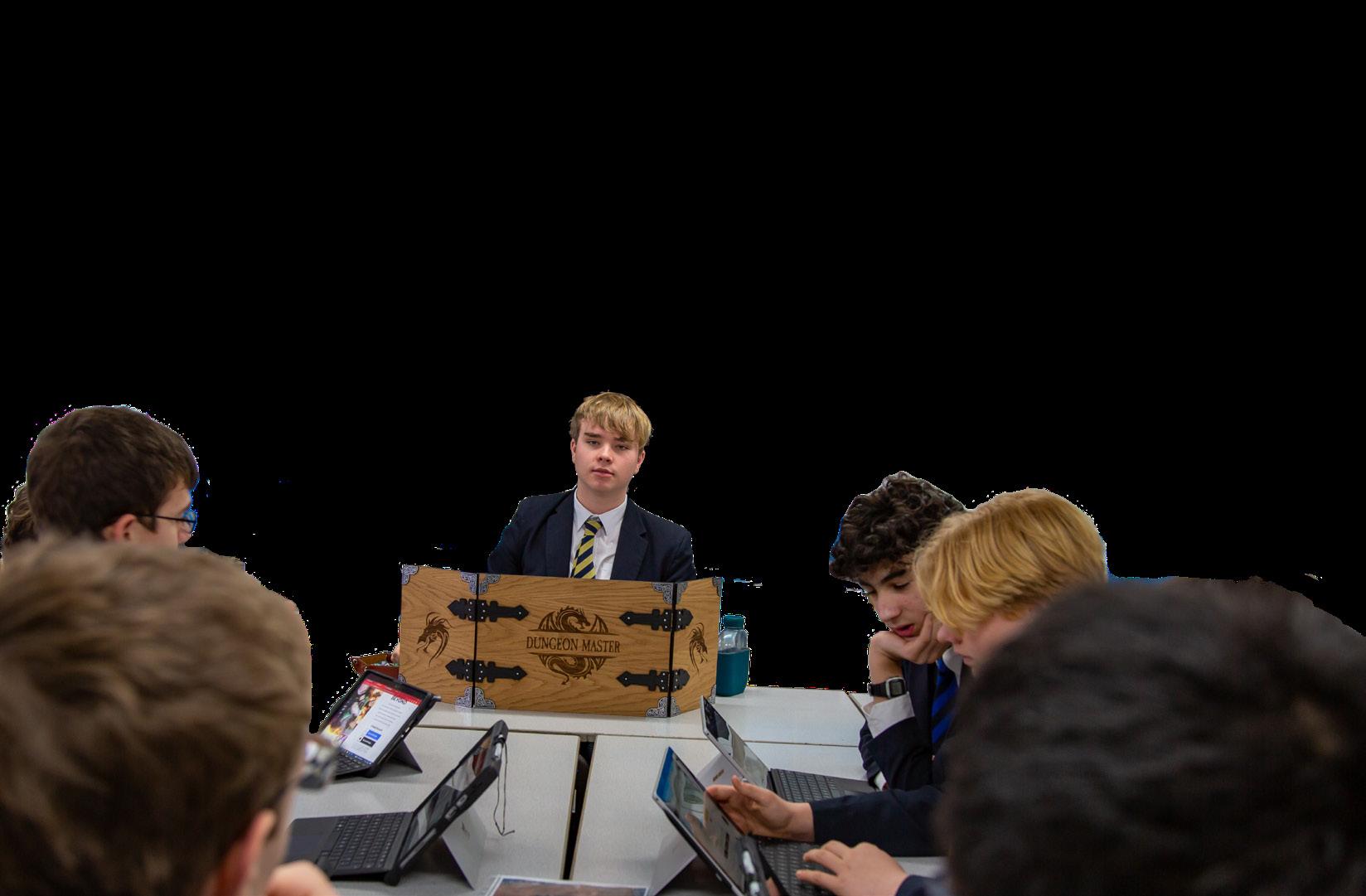
Can you tell us a bit about the AOB?
The AOB is made up of two halves, one half is Magic: The Gathering (colloquially known as Magic or MTG) and the other half is the AOB I run, which is Dungeons and Dragons (D&D). Dungeons and Dragons is a table top fantasy role playing game, similar to something you would find in a video game but as a board game. Magic: The Gathering is also a tabletop game, but played with cards.
In Dungeons and Dragons, there is a person in charge, who is known as the Games Master or Dungeon Master (GM or DM). They then present the players with a situation, and, with the characters the players have created themselves, they then respond to that situation and play out the game.
Fates are determined by dice rolls, so the game becomes a mixture of chance and critical thinking. You are then able to play out different adventures without having to leave the table!
How did the idea for a D&D AOB come about?
I first got interested in D&D in primary school, I had a friend who played so he introduced me to it and my interest grew from there. So, by the time I joined the Third Form, I had already been playing for a while. I had the idea to start this as an AOB, so I decided I could do this as the volunteering aspect of my Bronze Duke of Edinburgh’s Award (DofE). I spoke to some of my peers who
confirmed they were interested in joining and/or had played before, so with the help of an ex-teacher, Mr Kersley, who was keen to support me in setting up and supervising the AOB, the D&D AOB was born.
How did you go about setting it up?
My first port of call was to speak to the Director of Co-Curricular, Mr Sheer. I took my AOB proposal to him and explained how it would work. He advised that I needed to find a member of staff to supervise it. Once I had found Mr Kersley I was able to start the AOB.
Who can join the AOB?
Currently, the group is made up of a group of six pupils from the Fourth Form to the Upper Sixth, but it is open to all years. The group is a good size, it means there can be one Games Master and five players which allows us to go on larger adventures. Too few or too many players can make it more complicated to play, but we could always have two games running at once if we had enough people.
about playing the game, you can do anything you want. You can personalise the game and the characters you play with, build new worlds and even write your own history. It can be as simple or complicated as you choose.
How have you benefitted personally from running this AOB?
It has been hugely rewarding spending time doing something I love, and sharing that passion with others. I no longer run the sessions, but have taught George Adams (Fifth Form, Harcourt) to be a GM which in itself has been hugely rewarding. It is such a joy to see someone else taking an interest in D&D and enjoying the game as much as I do.
Planning different games every week has also greatly improved my organisational skills. At the start of a group of sessions, called a campaign, I give the players a story to go through. So each week I plan where I want the game to start, where I want it to finish and what I want to happen during the game. This has definitely improved
MEET THE SCHOOL - MR PARKER
What do you do at the School?
I am the Chaplain and coach the marathon racing kayak team.
When did you join?
I started working at Cokethorpe in January 2022 as a kayak coach and added the Chaplain’s role in September.
What made you join Cokethorpe?
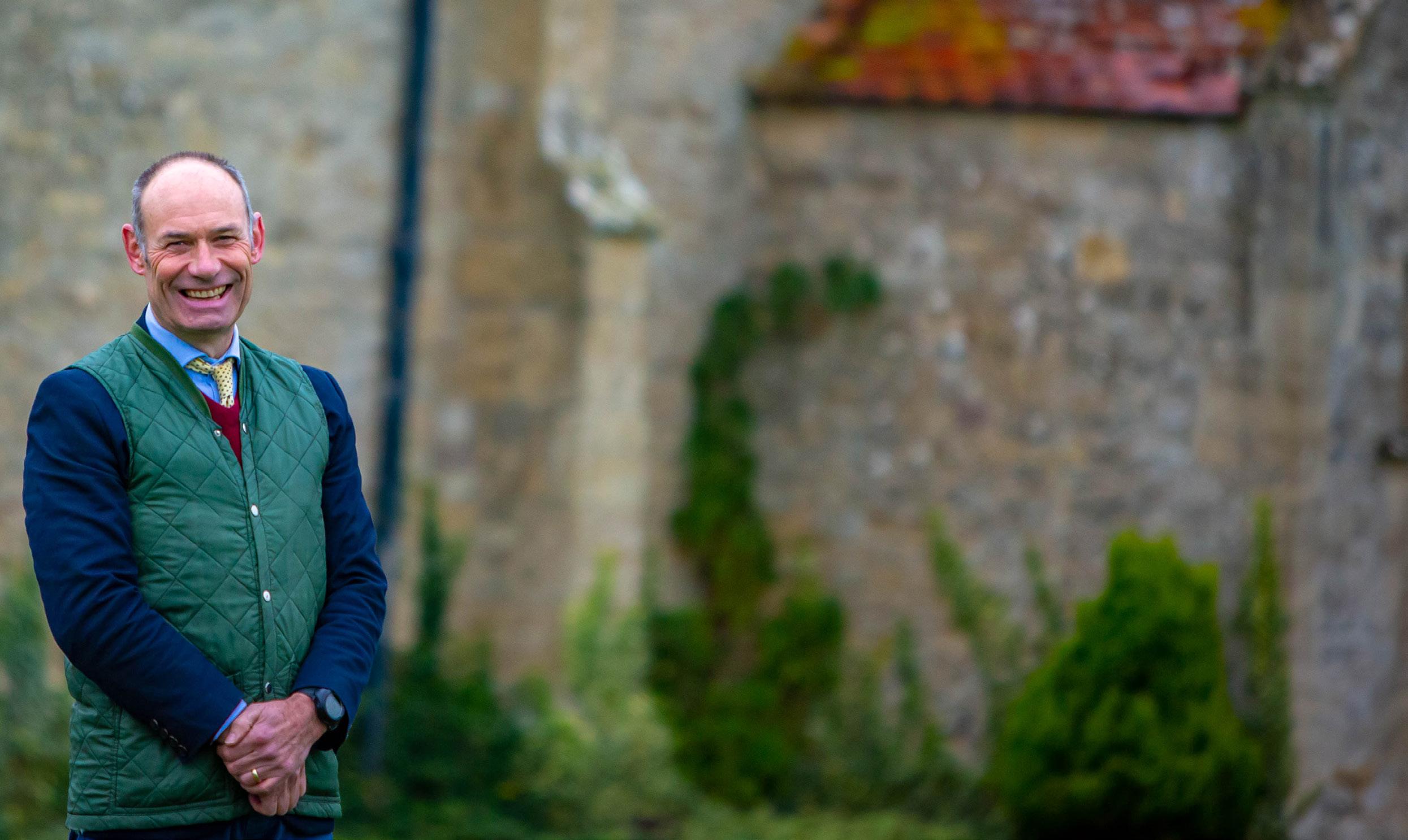
I live locally and was looking to take on some kayak coaching. Aware that Cokethorpe has consistently produced some of the top marathon racing kayak school crews in the past, I offered to help. Voilà!
What do you enjoy most about your job? Well, they are both very different and it is this that makes for such an interesting job. Sometimes I am coaching a small group of Sixth Form students on the river, and at others I am addressing the Pre-Prep, Prep,
Congratulations to Year 1 teacher Mrs Peace and her husband Andy, who welcomed baby Violet Emily Elizabeth Peace on Saturday 10 September, weighing 5lb 1oz. A little sister to big brothers James and Toby.
Congratulations to Head of Outdoor Education, Mr Slader and his wife Jessica, on the birth of their daughter
Thea Louise Slader, born on Monday 3 October weighing 7lbs 7oz.
Congratulations to Transport and Maintenance Administrator, Mrs Lee, and Groundsman, Mr Pounds, on the birth of their baby daughter, Lowenna
Margaret Florence Pounds, born on Wednesday 16 November weighing 8lb 6oz.
STAFF NEWS
or part of the Senior School in the Chapel. What variety!
What do you consider to be your greatest achievements?
I have two grown-up children I am very proud of, but I must admit that this is more thanks to my wife than me! Others would include beating Sir Ranulph Fiennes in a 33-mile race, traversing the Cuillin Ridge on Skye and completing the Senior DevizesWestminster Canoe Race.
Who is your hero and why?
All heroes are flawed, but I believe it is still good to have them. I served in the Army with some impressive people, but Henry Worsley stood out, himself inspired by Sir Ernest Shackleton, whom we both admired. He could inspire others in the most horrific situations when most would have lost all hope.
Congratulations to Teacher of Music and Housemaster of Feilden, Mr J Hughes on achieving his MBA in Senior Leadership.
We would like to welcome three new Governors:
Mrs J Norris
Mr K Walton
Mr M Wannell
Congratulations to Mr Robinson in his appointment as the Director of Sport.
Farewell
Mr R Cook, Head of Academic PE
Miss G McDougall, Teacher of MFL
Mr J Allen, Teacher of English
Mr C Morrison, Head of Prep Sport
Mr A Taghol, Teacher of Mathematics
In the next edition... a focus on... Next Steps
Welcome
Mr P Waghorn, Teacher of Physics
Miss S Parris, Teacher of English
Mr B Wilson, Director of Music
Miss H Hendrick, Head of Netball
Miss L Ryan, Lead in Computer Science
Mr S Oliver, Teacher of Classics
Ms J Dowd, Prep School Teacher (Maternity Cover)
Ms A Sanchez-Reyes, Teacher of MFL
Mr D Baker, Head of Prep Sport
Mrs L Coe, Prep School Teacher (Maternity Cover)
Mr J Gallagher, Head of Academic PE
Mrs A Martin, Teacher of English
Dr G Gilles, Teacher of Maths
Ms N Wynne, Director of Development
Mr J Bown, Teacher of Geography (Maternity Cover)
29
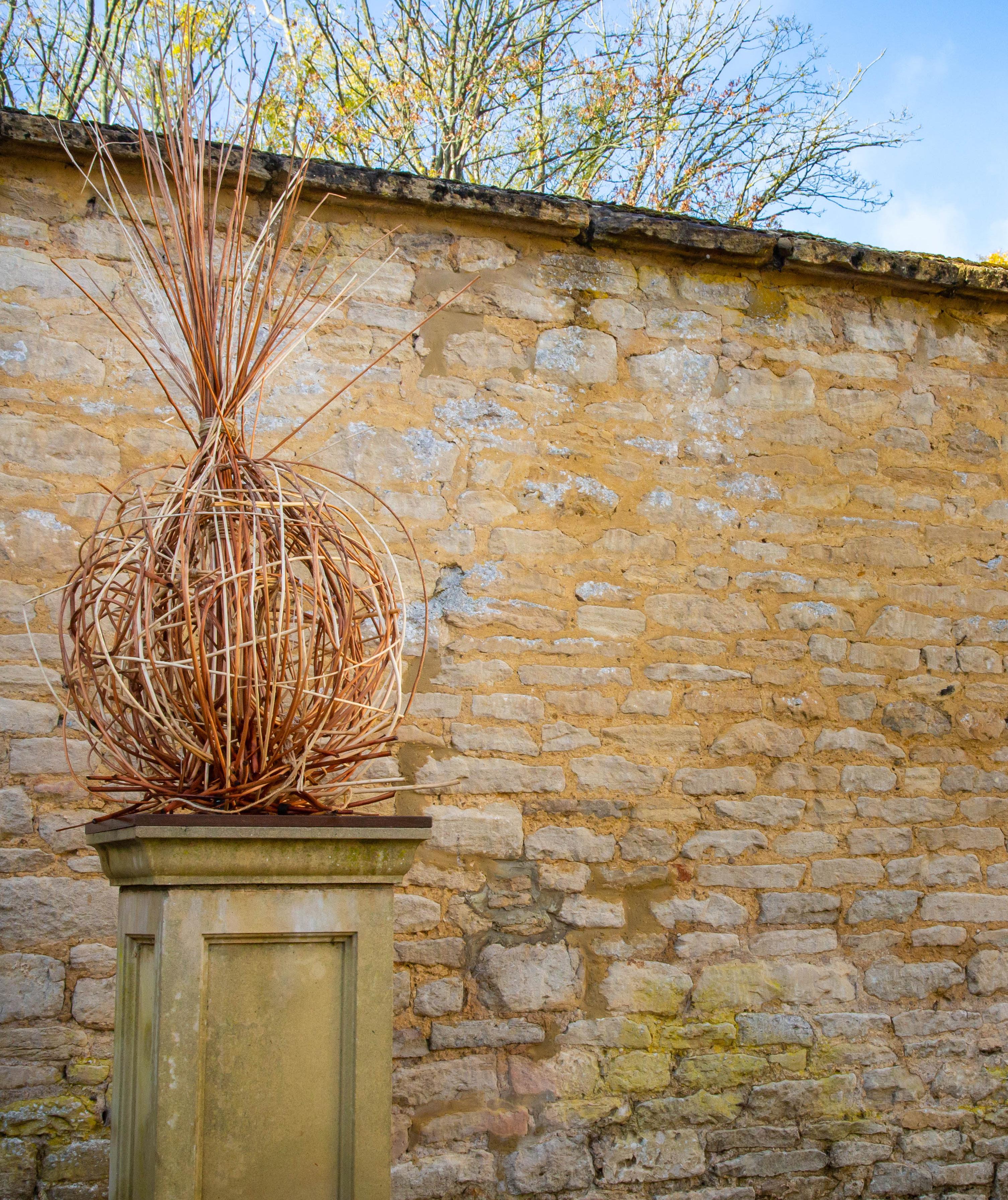
The Ocellus | Issue 49 | Winter 2022 Editor: Mrs L Williams (Communications Officer) Design and Layout: Mr N Brownless (Creative Officer) Published by Cokethorpe School. Cokethorpe School Witney, Oxon OX29 7PU Tel: 01993 703921 Email: admin@cokethorpe.org























































 Nina Larsson Second Form, Queen Anne
Amelia Younger Second Form, Feilden
Pippa Allen Fourth Form, Harcourt
Audrey McCormick Third Form, Vanbrugh
Amelie Boyle Third Form, Harcourt
Ella Sharp Third Form, Vanbrugh
Rosie Doland Fourth Form, Vanbrugh
Felt Cacti by Year 6 pupils
Nina Larsson Second Form, Queen Anne
Amelia Younger Second Form, Feilden
Pippa Allen Fourth Form, Harcourt
Audrey McCormick Third Form, Vanbrugh
Amelie Boyle Third Form, Harcourt
Ella Sharp Third Form, Vanbrugh
Rosie Doland Fourth Form, Vanbrugh
Felt Cacti by Year 6 pupils





















 Ms S Du Feu
Ms S Du Feu




